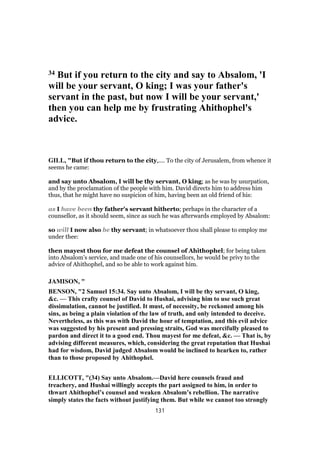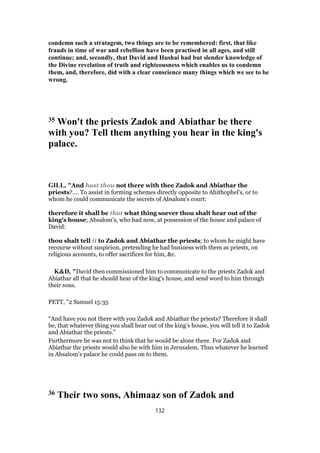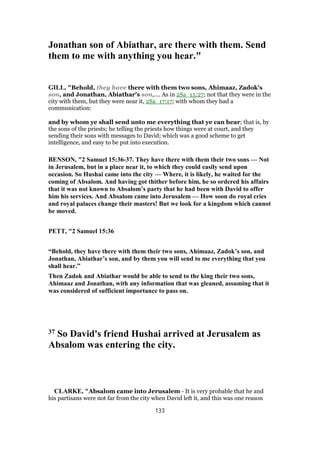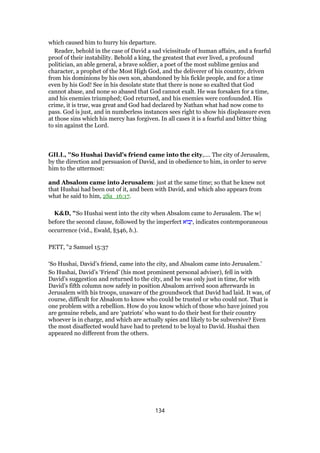In 2 Samuel 15, Absalom plots to usurp his father's throne by displaying royal pomp with chariots, horses, and a retinue, effectively stealing the hearts of the Israelites through flattery and manipulation. His actions follow a period of reconciliation with King David, showcasing his ambition and pride as he seeks to undermine his father's reign. Absalom's rebellion serves as a cautionary tale about the dangers of arrogance and the quest for power, reflecting patterns of distrust towards divinely ordained leadership.
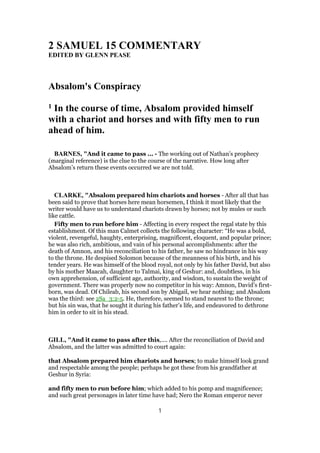
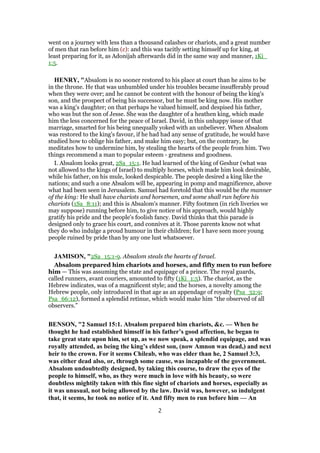
![honour this such as his royal father had neither had, nor thought of. These,
though attendants in appearance, were, in effect, guards.
K&D, "2Sa_15:1-3
Absalom seeks to secure the people's favour. - 2Sa_15:1. Soon afterwards (this
seems to be the meaning of ןֵכּ י ֲֵרח ַא ֵמ as distinguished from ןֵכּ י ֲֵרה ַ;א cf. 2Sa_3:28)
Absalom set up a carriage (i.e., a state-carriage; cf. 1Sa_8:11) and horses, and
fifty men as runners before him, i.e., to run before him when he drove out, and
attract the attention of the people by a display of princely pomp, as Adonijah
afterwards did (1Ki_1:5). He then went early in the morning to the side of the
road to the gate of the palace, and called out to every one who was about to go to
the king “for judgment,” i.e., seek justice in connection with any matter in
dispute, and asked him, “Of what city art thou?” and also, as we may see from
the reply in 2Sa_15:3, inquired into his feelings towards the king, and then said,
“Thy matters are good and right, but there is no hearer for thee with the king.”
ַﬠ ֵמֹשׁ signifies the judicial officer, who heard complainants and examined into
their different causes, for the purpose of laying them before the king for
settlement. Of course the king himself could not give a hearing to every
complainant, and make a personal investigation of his cause; nor could his
judges procure justice for every complainant, however justly they might act,
though it is possible that they may not always have performed their duty
conscientiously.
CONSTABLE, "Absalom's conspiracy 15:1-12
Two sub-sections each begin with a reference to time (2 Samuel 15:1; 2 Samuel
15:7) and form a literary "diptych" (i.e., two complementary panels). [Note:
Fokkelman, p. 165.] The first six verses explain how Absalom undermined
popular confidence in the Lord's anointed for four years. The last six relate his
final preparations to lead a military revolution against David.
"Whatever the reason, he exhibited the same patient scheming and relentless
determination which he had already shown when he set out to avenge the rape of
his sister (chapter 13); the leopard had not changed his spots. His hatred for
Amnon at least had had some excuse, but now it became clear that he had no
affection for his father either. Apart from his love for his sister Tamar, he
appears to have been a cold, ruthless and above all ambitious man." [Note:
Payne, p. 227.]
Absalom spent four years (2 Samuel 15:7, probably 980-976 B.C.) quietly
planning a coup. That "four" is the correct number rather than "40" seems
clear from other chronological references. [Note: See the Septuagint, and
Josephus, 7:9:1.] He did this by securing military weapons and supporters (2
Samuel 15:1; cf. 1 Kings 1:5), criticizing his father's administration (2 Samuel
15:2-3), promising to rule better than David (2 Samuel 15:4), and exercising
personal charm and flattery (2 Samuel 15:5-6). David was at this time (980-976
B.C.) building his palace in Jerusalem, then constructing a new dwelling place
for the ark, and finally making preparations for the temple (2 Samuel 5:9-12).
This may be the reason David was not meeting the needs of his people as well as
3](https://image.slidesharecdn.com/2samuel15commentary-160224024924/85/2-samuel-15-commentary-3-320.jpg)
![he might have done. It probably accounts for David's surprise when Absalom's
coup began as well.
Perhaps Absalom chose Hebron as the place to announce his rebellion because
that was his birthplace, and his support was probably strongest there. Some in
Hebron may have resented David's moving his capital from there to Jerusalem.
[Note: Laney, p. 113.] Ahithophel (2 Samuel 15:12) was probably Bathsheba's
grandfather (2 Samuel 11:3; 2 Samuel 23:34). Ahithophel's support of Absalom
may suggest that the general public did not know about God's choice of David's
successor. Ahithophel came from a town in Judah (Joshua 15:51).
Absalom's rebellion against God's anointed king is similar to the reaction of the
Jews to Jesus, the Lord's Messiah. They did not want Him to reign over them.
Consequently Jesus departed from them and returned to heaven, from which he
will return to reign over them eventually.
HAWKER, "(1) ¶ And it came to pass after this, that Absalom prepared him
chariots and horses, and fifty men to run before him.
The whole life of Absalom seems to have been sinful. He multiplies his train of
horses and his chariots, with running footmen to grace his equipage; whereas the
Lord had strictly forbidden this to his people Israel. Deuteronomy 17:15.
Moreover, the Lord had told Israel by his servant Samuel, that the king they
would choose, but not of the Lord's approbation, would be of this very character,
to take pride in what the Lord had forbidden; and that he would oppress his
subjects in the number of his chariots, horsemen, and servants. So that these
things ought to have been enough to have made the people look shy upon
Absalom; whereas it appears that so far from it, these tended to win their
affections. See 1 Samuel 8:11, etc
PINK, "And it came to pass after this, that Absalom prepared him chariots and
horses, and fifty men to run before him" (2 Sam. 15:1). The "after this" refers to
what now followed upon David’s receiving back into his favor the son who had
murdered a brother (14:33). If a spark of gratitude had burned in his breast,
Absalom would now have sought to do all in his power toward forwarding the
interests of his indulgent father. But alas, so far from strengthening the hands of
his royal parent, he sets to work to dethrone him. Absalom was now in the
position to develop his vile plan of deposing David. The methods he followed
thoroughly revealed what a godless and unscrupulous scoundrel he was. The
first thing here recorded of him at once intimated his utter contempt of God and
manifested his affinity with the heathen.
Jehovah requires His people to conduct themselves differently from the idolatrous
nations surrounding them, and therefore He gave, among others, this law for the
regulation of Israel’s king: But he shall not multiply horses to himself" (Deut. 17:16).
It was in accord with this, that, when the King of kings formally presented Himself to
4](https://image.slidesharecdn.com/2samuel15commentary-160224024924/85/2-samuel-15-commentary-4-320.jpg)
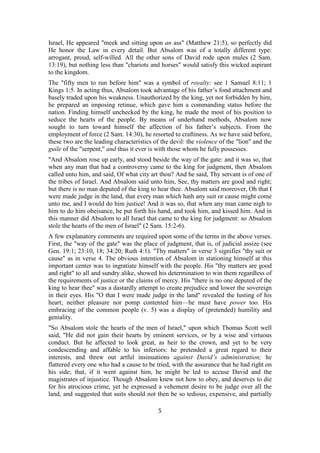
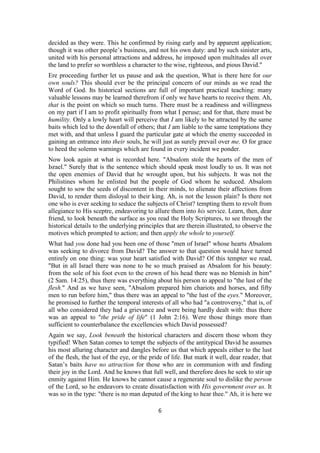
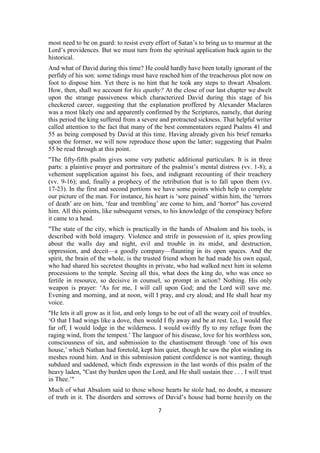
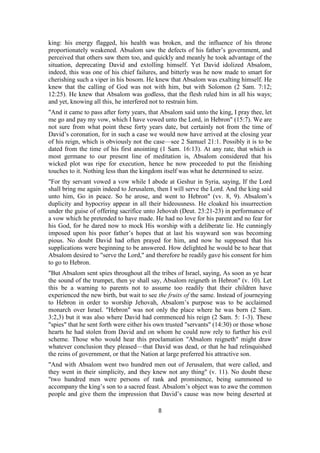
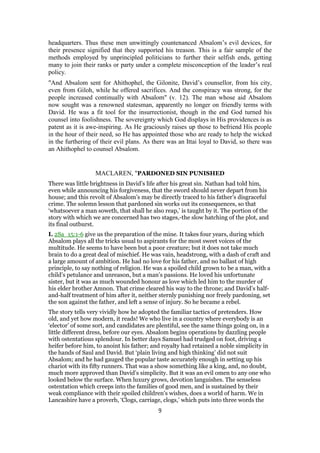
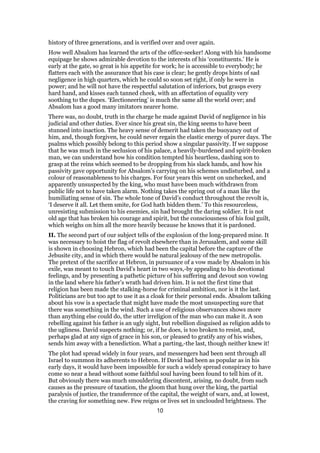
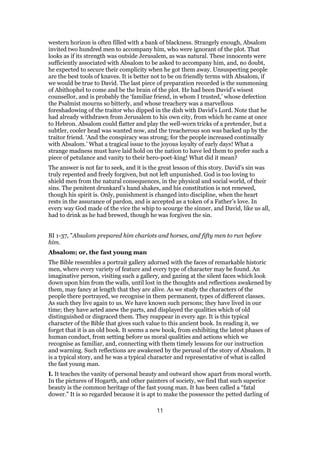
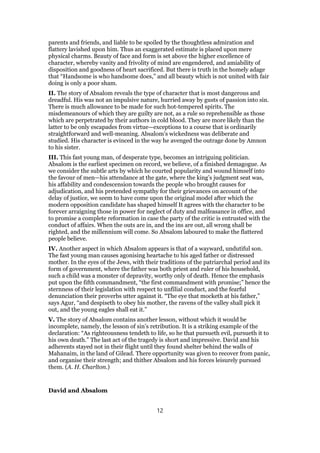
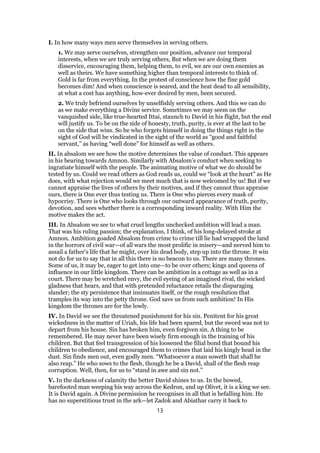
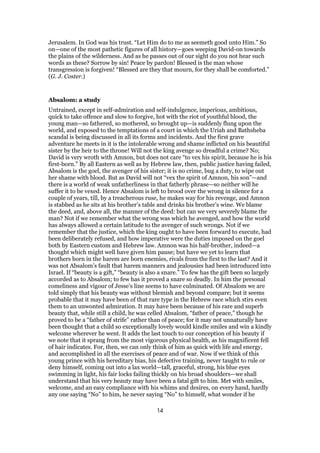
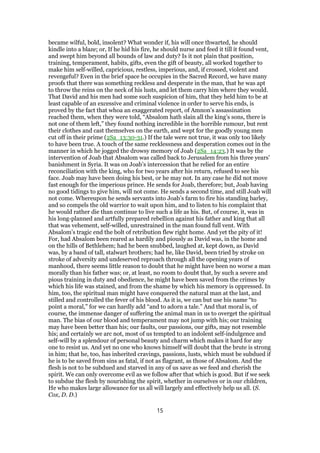
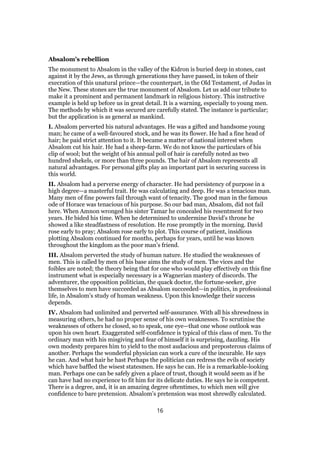
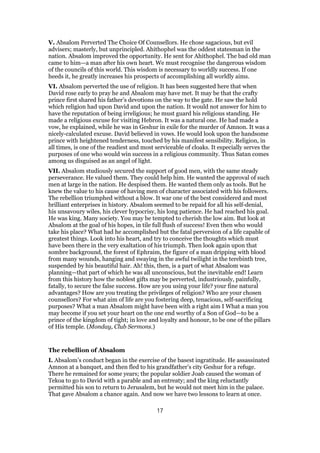
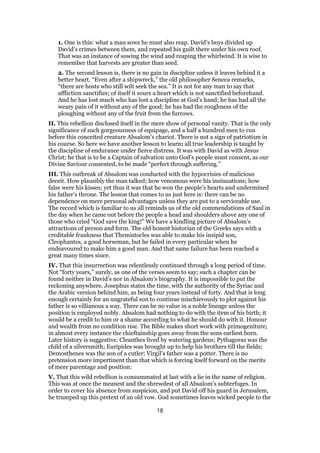
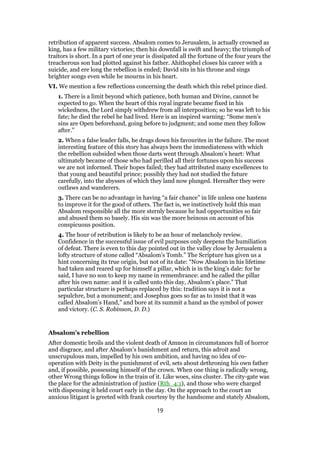
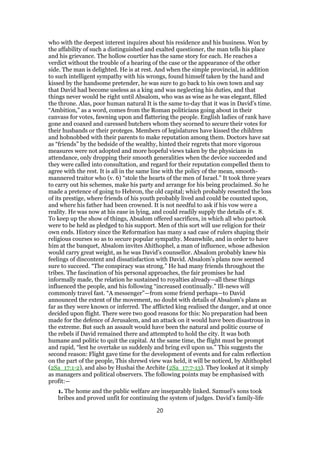
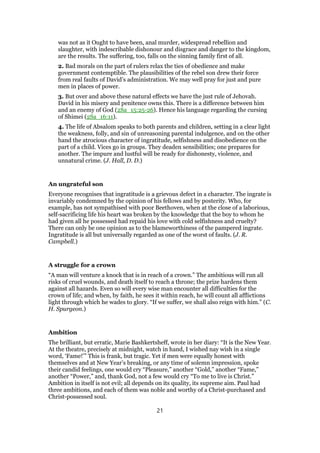
![COFFMAN 1-6, ""A chariot and horses, and fifty men to run before him" (2 Samuel
15:1). This ostentation by Absalom should have alerted David to his son's intentions.
Throughout history, the first step of any man seeking to usurp power was to procure
a bodyguard. Herodotus tells us how Pisistratus seized control of Athens by means of
that very procedure.[1] It was unusual for Israelites to ride in chariots drawn by
horses, and the practice was frowned upon by God's prophets. Samuel had warned
Israel that their king which they demanded would, "Take your sons and appoint them
to his chariots and to be horsemen, and to run before his chariots" (1 Samuel 9:11).
"Absalom probably learned this kind of display from his grandfather the pagan king
of Geshur, at whose court he had resided during the three years of his exile."[2]
By these bold actions, which were no doubt popular in Israel, Absalom was making a
bid to become king eventually and to be received as the heir-apparent to David. "Fifty
footmen running before him (in rich liveries we may suppose), thus giving notice of
his approach, would highly gratify his pride and the people's foolish fancy."[3]
However, Absalom had no intention of waiting until his father's death in order to
succeed him. "David had not taken any steps to designate a successor, and a rule of
succession had not been established for the monarchy. The death of Saul and
Jonathan had set a precedent against hereditary rule."[4]
"Oh that I were judge in the land" (2 Samuel 15:4). "He who himself should have
been judged to death for murder had the impudence to aim at being the judge of
others."[5] The arrogant conceit of this charlatan was not contained within any
boundaries whatever.
"Then every man ... might come to me, and I would give him justice" (2 Samuel 15:4).
"How much Absalom really cared for the rights of others may be seen in his arrogant
and crooked dealings with Joab (2 Samuel 14:28-33)."[6]
"Whenever a man came to do obeisance ... he took hold of him ... and kissed him" (2
Samuel 15:5). This was Absalom's way of feigning an "equality" with the people; he
interrupted their intentions to bow down before him by embracing and kissing them.
No doubt this type of flattery won him many adherents to his cause.
"It is a mistake to suppose that David altogether neglected his judicial duties. We
have just noted that the woman from Tekoa easily found access to the king's ears;
and, besides that, the reason Absalom had to arise early is that it was an early hour
when the king heard the suits brought before him. Note also that it was the plaintiffs
who were on their way to the king's tribunal whom Absalom accosted, and whom he
made to believe that he would have decided in their favor regardless of the merits of
the various cases."[7] Absalom's conduct in this underhanded attack against his
father was founded upon unscrupulous falsehood, deceit and hatred. Nevertheless,
due to David's sins and the sorrows brought upon him by God's punishments, it must
be considered very likely that to some degree David indeed had lost some of the
concern and efficiency which once marked his efforts before the evil times fell upon
22](https://image.slidesharecdn.com/2samuel15commentary-160224024924/85/2-samuel-15-commentary-22-320.jpg)
![him.
"Absalom stole the hearts of the men of Israel" (2 Samuel 15:6). His methods were
the same as that of any demagogue; he promised everyone whom he met that he
would give them what they wanted if only he were in authority. He pretended that he
was interested in justice for every one. "He showed interest in the private lives of the
people and made a pretence of protecting the poor and the lowly, insinuating that the
government was incompetent and that if he were in power everything would be
different."[8] All of this, of course, was as phony as similar pretensions by current
seekers of political office, but the people were deceived by it, reminding us of the
words of Voltaire who declared that, "The public is a ass"!
ELLICOTT, "1) Prepared him chariots and horses.—As a preparation for his
rebellion, it was necessary to impress the people with his wealth and splendour.
(Comp. 1 Kings 1:5, where Adonijah does the same thing.) This was the first use
in Israel of chariots and horses as a part of regal pomp.
LANGE, "2 Samuel 15:1. “After this.” The word here used (ןֵכ י ֲֵרח ַא ֵמ comp3:28)
shows that what is here related follows immediately[FN20] on the event narrated
in14:28–33. Absalom provides himself a state-chariot with its appurtenances
[fifty runners or footmen] in order thus to assume a royal appearance and to
attract the wondering attention of the people to himself. Comp. the similar
procedure of Adonijah, 1 Kings 1:5.
PETT, "Absalom Wins For Himself The Loyalty Of The People (2 Samuel
15:1-6).
Absalom had by now probably caught on to the fact that if he waited for David
to die the throne would be given to someone else. and that would explain why he
began to plan a coup. Initially his activity would only appear to be that of a
rather vain king’s son, but gradually it built up into something more insidious as
he began to convince the people that ‘if only he was in power’ all would get
justice. And yet even that might have been looked on by David with some
amusement as he saw it as being with the intention of building up support for
when David died. He had overlooked the traits that indicated that when Absalom
wanted anything, he was willing to do anything to obtain it.
At first sight all appears to go well for Absalom. Judah and Israel will be won
over, Ahithophel the Wise will join him in Hebron in order that together they
might commence the rebellion, and David will have to flee from Jerusalem for
his life, leaving the way wide open for Absalom into the capital. It is all part of
YHWH’s chastening of David for his great sins. But it will be made clear that
YHWH has not rejected David, and that because David’s heart is still right
towards him. Though he will chastise him severely (2 Samuel 7:14) he will then
enable him to retain the kingship, and the remainder of the account will indicate
23](https://image.slidesharecdn.com/2samuel15commentary-160224024924/85/2-samuel-15-commentary-23-320.jpg)
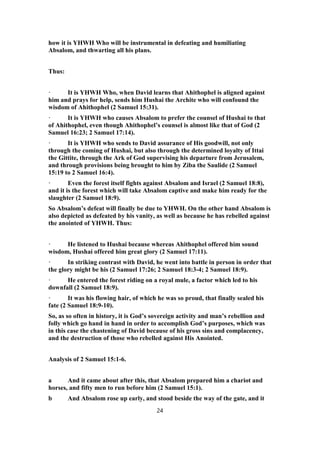
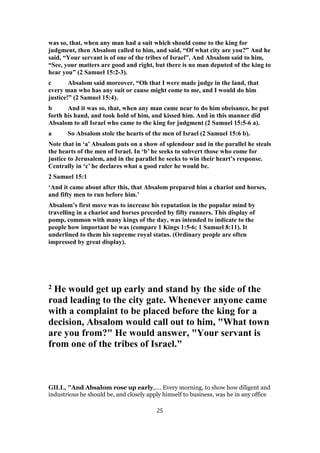
![trader the king, and especially when he should be king himself; this he did to
ingratiate himself into the affections of the people:
and stood beside the way of the gate; either of the king's palace, so Josephus
(d), or of the city, where courts of judicature are held: the former seems most
probable by what follows:
and it was so, that when any man that had a controversy came to the king
for judgment; that had a controversy with another man on any account, and came
to the king to have it decided according to law, or the rules of justice and equity:
then Absalom called unto him, and said, of what city art thou? which
question he asked, only to lead on to some further discourse:
and he said, thy servant is of one of the tribes; that is, of one of the cities of
the tribes of Israel, and not of a city of another nation.
HENRY, "(2.) A good opinion of his own fitness to rule. That the people might
say, “O that Absalom were a judge!” (and they are apt enough to desire changes), he
recommends himself to them, [1.] As very diligent. He rose up early, and appeared in
public before the rest of the king's sons were stirring, and he stood beside the way of
the gate, where the courts of judgment sat, as one mightily concerned to see justice
done and public business despatched. [2.] As very inquisitive and prying, and
desirous to be acquainted with every one's case. He would know of what city every
one was that came for judgment, that he might inform himself concerning every part
of the kingdom and the state of it, 2Sa_15:2. [3.] As very familiar and humble. If any
Israelite offered to do obeisance to him he took him and embraced him as a friend.
No man's conduct could be more condescending, while his heart was as proud as
Lucifer's. Ambitious projects are often carried on by a show of humility, Col_2:23.
He knew what a grace it puts upon greatness to be affable and courteous, and how
much it wins upon common people: had he been sincere in it, it would have been his
praise; but to fawn upon the people that he might betray them was abominable
hypocrisy. He croucheth, and humbleth himself, to draw them into his net, Psa_10:9,
Psa_10:10.
JAMISON 2-6, "Absalom rose up early, and stood beside the way of the
gate — Public business in the East is always transacted early in the morning - the
kings sitting an hour or more to hear causes or receive petitions, in a court held
anciently, and in many places still, in the open air at the city gateway; so that, as
those whose circumstances led them to wait on King David required to be in
attendance on his morning levees, Absalom had to rise up early and stand beside the
way of the gate. Through the growing infirmities of age, or the occupation of his
government with foreign wars, many private causes had long lain undecided, and a
deep feeling of discontent prevailed among the people. This dissatisfaction was
artfully fomented by Absalom, who addressed himself to the various suitors; and
after briefly hearing their tale, he gratified everyone with a favorable opinion of his
case. Studiously concealing his ambitious designs, he expressed a wish to be invested
with official power, only that he might accelerate the course of justice and advance
the public interests. His professions had an air of extraordinary generosity and
disinterestedness, which, together with his fawning arts in lavishing civilities on all,
made him a popular favorite. Thus, by forcing a contrast between his own display of
26](https://image.slidesharecdn.com/2samuel15commentary-160224024924/85/2-samuel-15-commentary-26-320.jpg)
![public spirit and the dilatory proceedings of the court, he created a growing disgust
with his father’s government, as weak, careless, or corrupt, and seduced the
affections of the multitude, who neither penetrated the motive nor foresaw the
tendency of his conduct.
BENSON, "2 Samuel 15:2. Absalom rose up early — He accustomed himself to
rise betimes in the morning, that he might make a show of solicitude for the good
of the public, and of every private person. When any man came to the king for
judgment — The king, it appears, reserved all weighty causes for his own
hearing; and appeals were made to him from the other courts. Absalom called to
him — Preventing him with the offers of his assistance. And, as if he were ready
to make particular inquiry into the state of his cause, and intended, to take
peculiar care of his interest, kindly inquired concerning his city, family, situation
in life, and the place of his abode.
HAWKER, "Verses 2-6
(2) And Absalom rose up early, and stood beside the way of the gate: and it was
so, that when any man that had a controversy came to the king for judgment,
then Absalom called unto him, and said, Of what city art thou? And he said, Thy
servant is of one of the tribes of Israel. (3) And Absalom said unto him, See, thy
matters are good and right; but there is no man deputed of the king to hear thee.
(4) Absalom said moreover, Oh that I were made judge in the land, that every
man which hath any suit or cause might come unto me, and I would do him
justice! (5) And it was so, that when any man came nigh to him to do him
obeisance, he put forth his hand, and took him, and kissed him. (6) And on this
manner did Absalom to all Israel that came to the king for judgment: so
Absalom stole the hearts of the men of Israel.
It is awful to consider the depth of guilt and sin in the heart of man. Here is a
man wishing himself a Judge, that merited judgment, and punishment, for the
murder even of his own brother! Here is such a character aspiring to a crown,
and yet apparently so very humble as to embrace the poorest creature in the
kingdom. Dearest Jesus! hadst thou not come down from heaven to redeem our
nature, and hadst thou not sent thy blessed Spirit to renew our nature; what man
alive would have believed that the same seeds of sin as are here seen bringing
forth their deadly fruit in the instance of Absalom, are in every man's heart by
nature. Lord keep me from that evil man myself!
LANGE, "2 Samuel 15:2 sq. Vivid description of his condescending behaviour
(in contrast with his pompous appearance) to gain the favor of the people in
connection with their law-matters. [He “rose up early” in order to show his zeal
and get opportunities; and such legal business is usually attended to very early in
the East; Malcolm (quoted by Philippson) says that Oriental ministers hold their
levees at an hour when Western people of quality are not yet up.—Tr.]. The
“gate” here referred to is the gate of the royal palace, whither those came that
sought the decision of the king in law-matters. “For judgment,” that Isaiah, for
27](https://image.slidesharecdn.com/2samuel15commentary-160224024924/85/2-samuel-15-commentary-27-320.jpg)
![legal decision. The “hearer” is the judicial officer whose duty it was first to hear
and understand the people’s matters, and then lay them before the king, an
auscultator. For just decision everything depends on careful hearing and
understanding. But there is no hearer for thee on the part of the king.—Absalom
guards indeed against accusing the king himself of injustice; but he excites in the
minds of the people distrust of the king’s whole judicial practice by saying that
there was no regular judicial process for a good and just cause. Perhaps neglect
and partiality had crept in, so that Absalom could find some handle for his
charges, and avail himself of an already existing dissatisfaction. In the words:
See, thy matters are good and right, he gives (in order to win favor) a judicial
decision before thorough investigation has been made. Thy just cause, says
Hebrews, is not investigated; else thou would’st not lack a favorable decision.
[Absalom shows himself master of the art of political intriguing—he flatters the
people and brings charges against the rulers. Perhaps his insinuations were
directed in part against the princes his brothers, possibly against Solomon
(Patrick), whose age, however, at this time we do not know, or whether it had
been intimated that he was heir to the throne.—Tr.].
PETT, "2 Samuel 15:2
‘And Absalom rose up early, and stood beside the way of the gate, and it was so, that,
when any man had a suit which should come to the king for judgment, then Absalom
called to him, and said, “Of what city are you?” And he said, “Your servant is of one of
the tribes of Israel.” ’
But he went further. Every day he would go down to the city gate (which was where
justice would normally be exercised) early in the morning and when anyone came by,
who had come to see the king in order to seek justice, he would begin to chat with
him and find out who he was and what his case was all about.
3 Then Absalom would say to him, "Look, your
claims are valid and proper, but there is no
representative of the king to hear you."
BARNES, "To flatter each man by pronouncing a favorable verdict in his case, to
excite a sense of grievance and discontent by censuring the king for remissness in
trying the causes brought before him by his subjects, and to suggest a sure and easy
remedy for all such grievances, namely, to make Absalom king; all this, coupled with
great affability and courtesy, which his personal beauty and high rank made all the
more effective, were the arts by which Absalom worked his way into favor with the
people, who were light and fickle as himself.
28](https://image.slidesharecdn.com/2samuel15commentary-160224024924/85/2-samuel-15-commentary-28-320.jpg)
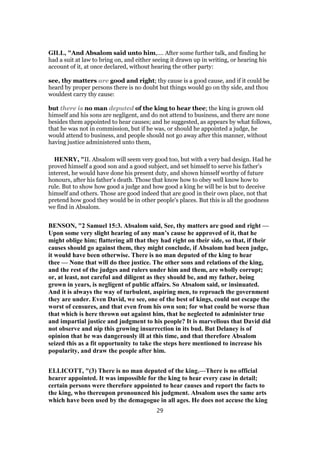
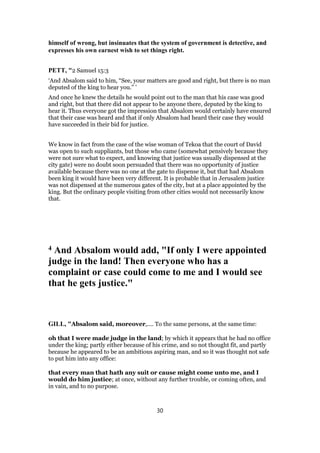
![HENRY 4-6, "1. He wishes that he were a judge in Israel, 2Sa_15:4. He had all the
pomp and all the pleasure he could wish, lived as great and in as much ease as any
man could; yet this will not content him, unless he have power too: O that I were a
judge in Israel! He that should himself have been judged to death for murder has the
impudence to aim at being a judge of others. We read not of Absalom's wisdom,
virtue, or learning in the laws, nor had he given any proofs of his love to justice, but
the contrary; yet he wishes he were judge. Note, Those are commonly most ambitious
of preferment that are least fit for it; the best qualified are the most modest and self-
diffident, while it is no better than the spirit of an Absalom that says, O that I were a
judge in Israel!
2. He takes a very bad course for the accomplishing of his wish. Had he humbly
petitioned his father to employ him in the administration of justice, and studied to
qualify himself for it (according to the rule, Exo_18:21), no doubt he would have
been sure of the next judge's place that fell; but this is too mean a post for his proud
spirit. It is below him to be subordinate, though to the king his father; he must be
supreme or nothing. He wants to be such a judge that every man who has any cause
shall come to him: in all causes, and over all persons, he must preside, little thinking
what a fatigue this would be to have every man come to him. Moses himself could not
bear it. Those know not what power is that grasp at so much, so very much. To gain
the power he aims at, he endeavours to instil into the people's minds,
(1.) A bad opinion of the present administration, as if the affairs of the kingdom
were altogether neglected, and no care taken about them. He got round him all he
could that had business at the council-board, enquired what their business was; and,
[1.] Upon a slight and general enquiry into their cause, he pronounced it good: Thy
matters are right. A fit man indeed to be a judge, who would give judgment upon
hearing one side only! For he has a bad cause indeed that cannot put a good colour
upon it, when he himself has the telling of the story. But, [2.] He told them that it was
to no purpose to appeal to the throne: “There is no man deputed of the king to hear
thee. The king is himself old, and past business, or so taken up with his devotions
that he never minds business; his sons are so addicted to their pleasures that, though
they have the name of chief rulers, they take no care of the affairs committed to
them.” He further seems to insinuate what a great want there was of him while he
was banished and confined, and how much the public suffered by his exile; what his
father said truly in Saul's reign (Psa_75:3) he says falsely: The land and all the
inhabitants of it are dissolved, all will go to wreck and ruin, unless I bear up the
pillars of it. Every appellant shall be made to believe that he will never have justice
done him, unless Absalom be viceroy or lord-justice. It is the way of turbulent,
factious, aspiring men, to reproach the government they are under. Presumptuous
are they, self-willed, and not afraid to speak evil of dignities, 2Pe_2:10. Even David
himself, the best of kings, and his administration, could not escape the worst of
censures. Those that aim to usurp cry out of grievances, and pretend to design
nothing but the redress of them: as Absalom here.
(2.) A good opinion of his own fitness to rule. That the people might say, “O that
Absalom were a judge!” (and they are apt enough to desire changes), he recommends
himself to them, [1.] As very diligent. He rose up early, and appeared in public before
the rest of the king's sons were stirring, and he stood beside the way of the gate,
where the courts of judgment sat, as one mightily concerned to see justice done and
public business despatched. [2.] As very inquisitive and prying, and desirous to be
acquainted with every one's case. He would know of what city every one was that
came for judgment, that he might inform himself concerning every part of the
kingdom and the state of it, 2Sa_15:2. [3.] As very familiar and humble. If any
Israelite offered to do obeisance to him he took him and embraced him as a friend.
No man's conduct could be more condescending, while his heart was as proud as
31](https://image.slidesharecdn.com/2samuel15commentary-160224024924/85/2-samuel-15-commentary-31-320.jpg)
![Lucifer's. Ambitious projects are often carried on by a show of humility, Col_2:23.
He knew what a grace it puts upon greatness to be affable and courteous, and how
much it wins upon common people: had he been sincere in it, it would have been his
praise; but to fawn upon the people that he might betray them was abominable
hypocrisy. He croucheth, and humbleth himself, to draw them into his net, Psa_10:9,
Psa_10:10.
BENSON, "2 Samuel 15:4-6. Absalom said, O that I were made judge in the
land! — Though he was admitted to come to court, and see the king, he had no
office there, as, it seems, the rest of the king’s sons had. This he took ill, and
endeavoured to bring the people to do so too, by persuading them that, if he were
in authority, he would take speedy care to do them justice. When any man came
nigh to do him obeisance — To fall prostrate before him as the king’s son. He
put forth his hand and took him — That is, prevented him from prostrating
himself, and condescended even to salute him with a kiss. In this manner did
Absalom to all Israel — Robbed his father of the affections of the people, and
possessed himself of them; some admiring his beauty and gallantry; others his
courtesy and civility; and others being taken with his magnificent promises of
the noble things he would do if he were their king.
K&D, "2Sa_15:4
Absalom also said, “Oh that I might be judge in the land, and every one who had
a cause might come before me; I would procure him justice!” יִנ ֵמ ִשְׂי י ִמ is a wish:
“who might (i.e., oh that one might) appoint me judge,” an analogous expression
to ן ֵתִּי ot י ִמ (vid., Gesenius, §136, 1, and Ewald, §329, c.). ַילָﬠ placed before א ִָבי for
the sake of emphasis, may be explained from the fact that a judge sat, so that the
person who stood before him rose above him (comp. Exo_18:13 with Gen_18:8).
יק ִדּ ְצ ִ,ה to speak justly, or help to justice.
LANGE, "2 Samuel 15:4. “O that I were made Judges,” literally: “who will
make me judge!” (Ges. § 136, 1). “That to me [lit. “on me”], might come every
man.” The “to me” is put first for the sake of emphasis; Absalom contrasts
himself as just judge with the state of things under his father. לַﬠ (“on me”)
stands for ל ֶא (“to me”), or, the sentence is to be explained with Thenius from the
collective idea “all men” (ישׁ ִל־אָכּ): “In imagination Absalom sees the litigants
assembled around him;” comp. Exodus 18:13; Judges 3:19; 1 Samuel 22:6. The
phrase “on me” is not to be explained from the sitting of the judge and the people
standing around above him. [The phrase “come on me” is like English “press
on,” “lean on,” and implies probably that Absalom would bear their burdens, or
else, the proposition here = “at, near, with” (apud).—Tr.].—I would do him
justice.—Absalom here presumes on the people’s litigiousness and their
confidence in the justice each man of his own cause, and, having brought his
father’s judicial procedure into discredit with them, promises to do every man
justice. Vulg.: “I should judge justly.”
PETT, "2 Samuel 15:4
‘Absalom said moreover, “Oh that I were made judge in the land, that every man who
32](https://image.slidesharecdn.com/2samuel15commentary-160224024924/85/2-samuel-15-commentary-32-320.jpg)
![has any suit or cause might come to me, and I would do him justice!” ’
Having given his assurance to each one who came that had he been ruler they would
have succeeded in their case, Absalom would then proclaim for all within hearing to
hear that if only he were king in the land every man would be able to come to him
and would obtain justice, in other words would win his case.
5 Also, whenever anyone approached him to bow
down before him, Absalom would reach out his hand,
take hold of him and kiss him.
GILL, "And it was so, that when any man came nigh to him to do him
obeisance,.... To pay his respects, and bow to him, as being the king's son, a prince
of the blood, and heir to the crown, as was supposed:
he put forth his hand, and took him, and kissed him; he put out his hand and
shook hands with him, or took him about the neck and kissed him, and by this free,
familiar, affable, and courteous manner, strangely won upon and gained the
affections of the people, as follows. Fortunatus Schacchus (e) thinks he put forth his
hand to be kissed by them, and then kissed them, which was more than was usual.
K&D, "2Sa_15:5
And when any one came near to him to prostrate himself before him, he took him
by the hand and kissed him. It was by conduct of this kind that Agamemnon is said to
have secured the command of the Grecian army (Euripid. Iphig. Aul. v. 337ff.).
LANGE, "2 Samuel 15:5 sq. [Absalom’s affability]. He magnanimously puts aside the
honor gained by these arts, and attaches the people to him by a pretended
fraternization with every man. The result of these preparations for the purposed
insurrection: Absalom stole the hearts of the men of Israel.—The phrase (ֵבל ַבנָגּ) may
also mean “to deceive the heart,” as in Genesis 31:20; but the connection shows that the
meaning here is “to steal the heart.” [Sept. very well: “made his own the heart,” ἰδιοποιεῖτο;
Vulg.: solicitabat corda.—Tr.]. He turned the hearts of the people by guile from his father to
himself. [Patrick: a most vile piece of flattery ( 2 Samuel 15:5), yet acceptable to the people.
So Plato (Rep. Lib. viii.), describes those as doing that would get possession of the
government; and see Aristotle Pol. V:4. Absalom’s beautiful person no doubt attracted the
people, as well as his condescending familiarity of manner.—Tr.]
33](https://image.slidesharecdn.com/2samuel15commentary-160224024924/85/2-samuel-15-commentary-33-320.jpg)
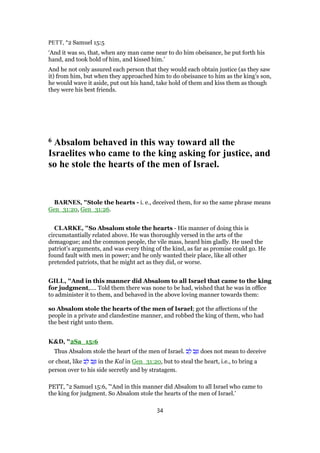
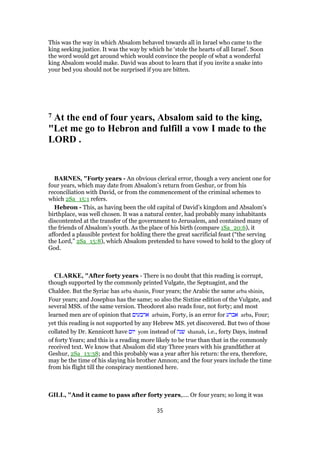
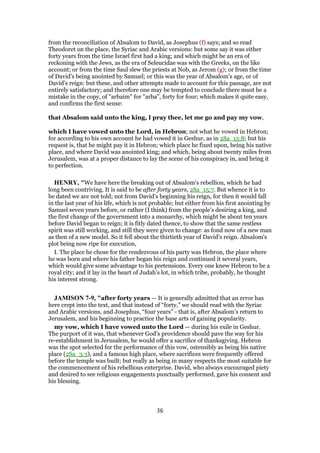
![BENSON, "2 Samuel 15:7. After forty years — That is, as some say, from the
change of the government into a monarchy, which change took place about ten
years before David began to reign. So that this fell out about the thirtieth year of
his reign. But the Syriac and Arabic, whom Houbigant follows, read, After four
years; that is, from the time of his father’s reconciliation with him. Josephus,
Theodoret, the manuscripts mentioned in the Benedictine edition of Jerome’s
version, the canon of the Hebrew verity, (supposed to be made about the ninth
century, and altered by some correcting hand,) the reading of the famous Latin
Bible of Sextus, the Latin manuscript in Exeter college library, marked C. 2. 13.,
and the ancient Latin manuscript written in Gothic characters, the variations of
which are published in Blanchini’s Vindiciæ, all have it, four; so that Grotius,
and, after him, Patrick, were well supported in having pronounced so decisively,
that it would admit of no doubt that an error had crept into the text, and that
instead of ,ארבעים arbagnim, forty, should be read ,ארבע arbang, four. See
Kennicott’s Dissert., vol. 2. p. 358, and Houbigant’s note. Let me go and pay my
vow which I have vowed to the Lord in Hebron — To wit, to perform there by
some solemn sacrifice. As Delaney is of opinion that a very grievous sickness of
David gave Absalom occasion to take the forementioned steps, so he thinks that
his father’s unexpected recovery, perhaps through God’s extraordinary
influence, broke Absalom’s measures for some time, and made him postpone his
wicked purpose. In the mean time, his popularity had all the field he could wish.
As all the people of Israel resorted to Jerusalem thrice in every year, on the three
solemn festivals, he had so often an opportunity of paying his court, and
insinuating his poison, till the infection spread through the whole body of the
realm, and wanted nothing but a fair occasion to display itself in all its malignity,
which Absalom sought by going to Hebron.
COFFMAN 7-11, ""At the end of four years" (2 Samuel 15:7). The KJV and
other ancient versions have "forty years" here instead of "four"; but the RSV is
doubtless correct here in following the Syriac and certain texts of the LXX.[9]
This indicates that it took Absalom four years from the time he was reconciled
with David to launch his attempted coup de etat.
"In Hebron" (2 Samuel 15:1,9,10). The reason for Absalom's choice of Hebron
as the place to launch his rebellion might have been complex. He was born in
Hebron and might have had many friends there. Young wrote that, "Hebron still
bore a grudge against David because he had moved the seat of his government to
Jerusalem. Also, the allied clans of the Negev, through whose good offices David
first mounted the throne, were jealous of the northern tribes who had become
the dominant partner in the united kingdom, and whose power had made them
very influential with the king."[10]
"Absalom sent secret messengers throughout all the tribes of Israel" (2 Samuel
15:10). "It is evident that much more elaborate preparations had been made for
this effort of Absalom to seize the throne than appears on the surface of this
37](https://image.slidesharecdn.com/2samuel15commentary-160224024924/85/2-samuel-15-commentary-37-320.jpg)
![concise narrative."[11]
"With Absalom went two hundred men from Jerusalem" (2 Samuel 15:11).
These were invited guests, probably the most influential and powerful men in
Jerusalem; but they were not co-conspirators with Absalom. Although ignorant
of Absalom's plans, they would have been supposed by the citizens of Hebron to
be Absalom's partisans. Furthermore, if they had, in any manner, objected to
Absalom's having himself proclaimed as king, they would have, at once, become
his hostages. This was a clever maneuver indeed.
ELLICOTT, "(7) After forty years.—The reading is certainly incorrect.
Absalom was born after David began his reign in Hebron, and his whole reign
was only forty years. Absalom therefore was not yet forty at his death. The
reading found in the Syriac and most MSS. of the Vulgate, and adopted by
Josephus, four years, is probably correct. It remains uncertain from what point
this four years is to be reckoned; probably it is from Absalom’s return to
Jerusalem.
Pay my vow . . . in Hebron.—We have no means of knowing whether this vow
was real or fictitious; certainly Absalom now uses it as a pretext, and yet there is
nothing improbable in his having actually made such a vow during his exile.
Hebron was the place of his birth and childhood, as well as a holy city from very
ancient times, and was thus a suitable place for the performance of his vow; it
was also at a convenient distance from Jerusalem, and had been the royal city of
David for the first seven years of his reign. It was thus well adapted to be the
starting place of Absalom’s rebellion, and it is not unlikely, moreover, that the
men of Hebron may have resented the transfer of the capital to Jerusalem, and
therefore have lent a willing ear to Absalom. Like many other culprits, Absalom
veils his crime under the cloak of religion, pretending submission to his father,
and receiving his blessing at the very moment when he is striking at his crown
and his life.
HAWKER, "Verses 7-9
(7) ¶ And it came to pass after forty years, that Absalom said unto the king, I
pray thee, let me go and pay my vow, which I have vowed unto the LORD, in
Hebron. (8) For thy servant vowed a vow while I abode at Geshur in Syria,
saying, If the LORD shall bring me again indeed to Jerusalem, then I will serve
the LORD. (9) And the king said unto him, Go in peace. So he arose, and went to
Hebron.
It is not very easy to ascertain the time from whence we are to calculate these
forty years. It cannot mean after forty years of David's reign; for his whole reign
was no more than forty; and it should seem that this rebellion broke out at least
ten years before the death of David. Some have thought that it means after forty
years that Israel had been governed by a king. And if so, this makes the
38](https://image.slidesharecdn.com/2samuel15commentary-160224024924/85/2-samuel-15-commentary-38-320.jpg)
![calculation to be just, as it happened in about the thirtieth year of David's reign.
Here is another proof of the fallacy of the human heart, to make religion a
covering for the basest designs. Was it not enough, Absalom, that you leveled a
dagger at your too kind and indulgent father; but must God himself be impiously
mocked in the attempt?
K&D 7-8, "Absalom's rebellion. - 2Sa_15:7, 2Sa_15:8. After the lapse of forty (?)
years Absalom said to the king, “Pray I will go (i.e., pray allow me to go) and
perform a vow in Hebron which I vowed to the Lord during my stay at Geshur”
(2Sa_15:8). The number forty is altogether unsuitable, as it cannot possibly be
understood either as relating to the age of Absalom or to the year of David's reign: for
Absalom was born at Hebron after David had begun to reign, and David only reigned
forty years and a half in all, and Absalom's rebellion certainly did not take place in
the last few weeks of his reign. It is quite as inappropriate to assume, as the terminus
a quo of the forty years, either the commencement of Saul's reign, as several of the
Rabbins have done, as well as the author of the marginal note in Cod. 380 of De
Rossi (שאול ,)למלכות or the anointing of David at Bethlehem, as Luther (in the
marginal note) and Lightfoot do; for the word “after” evidently refers to some event
in the life of Absalom, to which allusion has previously been made, namely, either to
the time of his reconciliation with David (2Sa_14:33), or (what is not so probable) to
the period of his return from Geshur to Jerusalem (2Sa_14:23). Consequently the
reading adopted by the Syriac, Arabic, and Vulgate, also by Theodoret and others,
viz., “four years,” must certainly be the correct one, and not “forty days,” which we
find in Codd. 70 and 96 in Kennicott, since forty days would be far too short a time
for maturing the rebellion. It is true, that with the reading ע ַ ְרፍ we should expect, as a
rule, the plural יםִנ ָ.שׁ At the same time, the numbers from two to ten are sometimes
construed with a singular noun (e.g., 2Ki_22:1; cf. Gesenius, §120, 2). The pretended
vow was, that if Jehovah would bring him back to Jerusalem, he would serve
Jehovah. הָּוהְת־י ֶא ד ַב ָ,ע “to do a service to Jehovah,” can only mean to offer a sacrifice,
which is the explanation given by Josephus. The Chethib יב ִשָׁי is not the infinitive, but
the imperfect Hiphil: si reduxerit, reduxerit me, which is employed in an unusual
manner instead of the inf. absol., for the sake of emphasis. The Keri שׁוּבָי would have
to be taken as an adverb “again;” but this is quite unnecessary.
LANGE, "2 Samuel 15:7. The statement of time: At the end of forty years, is certainly
wrong according to the connection. An immediate sequence of events being indicated
in 2 Samuel 15:1 [see on 2 Samuel 15:1 and translator’s note], the phrase “at the end
of” can only point to a previous occurrence in Absalom’s life—not, however, to his
return from Geshur, which is not important enough in the narrative to serve as
reckoning-point (terminus a quo) for a new series of events, but rather to his
reconciliation with David (14:33). But Absalom’s procedure here described ( 2
Samuel 15:1-6) up to his insurrection cannot have lasted forty years; and further,
such a space of time cannot be fitted into the history of David and Absalom, though
this would be allowable only in case there were here indicated some chronological-
historical point of support, as it has been attempted to find, for example, in
Absalom’s age at this time or in the duration of David’s reign. According to these
conjectures Absalom’s conspiracy must have occurred in the last days of David’s
reign, and this would be wholly unhistorical. The reading of Codd70,90 (Kennicott)
“forty days” is a violent attempt to remove the difficulty, and only introduces another
39](https://image.slidesharecdn.com/2samuel15commentary-160224024924/85/2-samuel-15-commentary-39-320.jpg)
![difficulty, since forty days is too short a time after Absalom’s reconciliation with his
father for all his preparations here described. We must read “four years” with Syr,
Arab, Vulg. [but Codex Amiatinus has “forty”—Tr.], Josephus, Theodoret (Capellus,
Grotius, Ewald, Thenius, Keil and others [Bib-Com.]).[FN21] [Others, (as Ussher,
Patrick, Cahen, Philippson) retain the number “forty,” and reckon it in various ways,
some from the beginning of David’s reign (Abarbanel), some from David’s
anointment by Samuel (Ussher and others), some from the people’s demand for a
king (Seder Olam); but the objection to all these is (as Erdmann above suggests) that
there is no hint in the text of so remote a terminus a quo as any of them; the time is
evidently reckoned from some near event. Though the number four is more probable
than forty, it is after all only a conjecture, though a well-supported one; the
chronology must here be regarded as uncertain.—Tr.].
PETT, "Absalom Attempts A Coup (2 Samuel 15:7-11).
Once he felt that he had won over sufficient men of Israel and Judah to his side
Absalom decided he would attempt a coup at Hebron. Hebron had been David’s
previous capital city and was the capital city of Judah, and the inhabitants of Hebron
may well have felt especially disaffected towards David because of his transfer of the
status of capital city to Jerusalem. It may well be that at this time the Tabernacle was
in Hebron, where a Tabernacle would have been set up by David when he was made
king of Judah. If so, it would later be transferred to Gibeon (1 Kings 3:4), possibly as
a result of what now happened. Being crowned at the Tabernacle (we are specifically
informed that Absalom was anointed as king - 2 Samuel 19:10) would add to his
legality in Israel’s eyes.
Analysis.
a And it came about at the end of forty years, that Absalom said to the king, “I
pray you, let me go and pay my vow, which I have vowed to YHWH, in Hebron” (2
Samuel 15:7).
b “For your servant vowed a vow while I abode at Geshur in Syria, saying, ‘If
YHWH shall indeed bring me again to Jerusalem, then I will serve YHWH” (2
Samuel 15:8).
c And the king said to him, “Go in peace.” So he arose, and went to Hebron (2
Samuel 15:9).
b But Absalom sent scouts throughout all the tribes of Israel, saying, “As soon
as you hear the sound of the trumpet, then you shall say, ‘Absalom is king in
Hebron.’ ” (2 Samuel 15:10).
a And with Absalom went two hundred men out of Jerusalem, who were
invited, and went in their simple innocence, and they knew nothing (2 Samuel 15:11).
Note that in ‘a’ Absalom wished to go to Hebron on a special occasion to pay his vow,
and in the parallel he did so accompanied by two hundred men. In ‘b’ his pretence is
that he is going to serve YHWH, and in the parallel his intended service of YHWH
will turn out to be a very different one than David had thought. Centrally in ‘c’ David
wishes him peace, and he goes off in order to rebel.
2 Samuel 15:7
40](https://image.slidesharecdn.com/2samuel15commentary-160224024924/85/2-samuel-15-commentary-40-320.jpg)
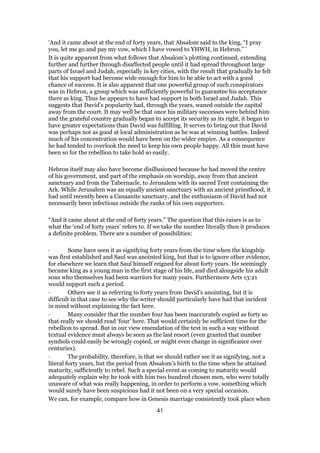
![someone was ‘forty years’ old, in other words was seen as mature enough for
marriage (Genesis 25:20; Genesis 26:34). It is very unlikely that in either case they
would literally have waited until they were forty years of age. But larger numbers
were used in this general kind of way. See also Joshua 14:7, where Joshua said of
himself that he was ‘forty years old’ when he was sent out as a spy into Canaan
(which if taken literally would mean that he began the conquest when he was seventy
eight years old), and compare the constant use of ‘forty years’ as indicating important
periods in the books of Judges, Samuel and Kings, where it is unlikely that we should
take them too literally (see Judges 3:11; Judges 5:31; Judges 8:28; Judges 13:1; 1
Samuel 4:18; 2 Samuel 2:10; 2 Samuel 5:4; 1 Kings 2:11; 1 Kings 11:42; 2 Kings 12:1).
They may well in these cases signify ‘a generation’. This is not to say that the figure is
‘incorrect’. It is, in the terms of the time when it was written, fully correct. It was
simply the Hebrew way of indicating a longish period which was complete in itself
(compare the similar use of ‘forty days’), something not simply confined to the
Hebrews. For we should remember that whereas we have been brought up to think
numerically, the majority of ancients were innumerate and saw larger numbers as
being used as adjectives in order to give an impression rather than as intended to be
numerically accurate. This verse is thus probably saying that Absalom, having
attained the age of maturity, wanted to go to Hebron to ‘pay his vow’. The age of
maturity may actually have been twenty, the age at which he became eligible to fight
for Israel (Numbers 1:3; etc), or twenty five, the age at which the Levite
apprenticeship began (Numbers 8:24), or even thirty when the Levite (and
presumably the priest) came to full maturity (Numbers 4:3; etc). Absalom was after
all one of the king’s ‘priests’. This would also make sense as explaining why at this
time he wished to fulfil his vow in order to be a true priest to YHWH, that is, to ‘serve
YHWH’.
8 While your servant was living at Geshur in Aram, I
made this vow: 'If the LORD takes me back to
Jerusalem, I will worship the LORD in Hebron. [2] ' "
CLARKE, "While I abode at Geshur in Syria - Geshur, the country of
Talmai, was certainly not in Syria, but lay on the south of Canaan, in or near Edom,
as is evident from Jdg_1:10; 1Sa_27:8; 2Sa_13:37. Hence it is probable that ארם
Aram, Syria, is a mistake for אדם Edom; ד daleth and ר resh being easily
interchangeable. Edom is the reading both of the Syriac and Arabic.
I will serve the Lord - Here he pretended to be a strict follower of Jehovah, even
while he was in a heathen country; and now he desires liberty to go and perform a
vow at Hebron, which he pretends to have made while he was resident at Geshur.
And all this was the more perfectly to organize his system of rebellion against his
venerable father.
42](https://image.slidesharecdn.com/2samuel15commentary-160224024924/85/2-samuel-15-commentary-42-320.jpg)
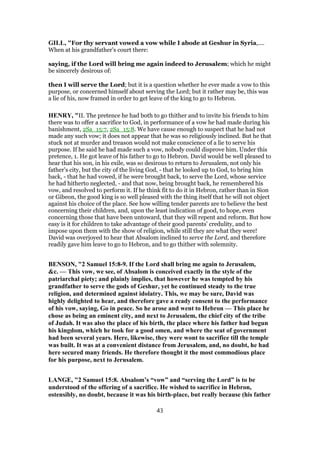
![having there assumed the crown) he considered it a peculiarly suitable place for
his being proclaimed king. He chose this place, not because there was
dissatisfaction at the removal of the royal residence to Jerusalem (Thenius and
Keil, following the “Exegetical Manual”), but because he could there count on a
numerous following from the tribe of Judah.[FN22] [We have here an example of
sacrificial feasting not in connection with the Tabernacle (as in David’s history 1
Samuel 20:6), an indication that the strict law of Leviticus ( Leviticus 17:3-4;
comp. Deuteronomy 12:13-14) was not in practical operation; else David would
have objected to sacrificing in Hebron.—Tr.].
PETT, "2 Samuel 15:8
“For your servant vowed a vow while I abode at Geshur in Aram (Syria), saying,
‘If YHWH shall indeed bring me again to Jerusalem, then I will serve YHWH.”
Absalom then explained how when he was in Geshur he had made a solemn vow
to YHWH that if He would restore him to his rightful position in Jerusalem, he
would ‘serve Him’. The verb ‘to serve’ can have a general significance of
obedience to YHWH (e.g. Deuteronomy 6:13) but it can also have the special
significance of ‘serving’ in a levitical or priestly fashion (e.g. Numbers 3:7;
Numbers 18:7). If the king’s sons were seen as ‘priests after the order of
Melchizedek’, and as connected with the sanctuary as intercessory priests (see on
2 Samuel 8:18), this would make good sense. Others see it as signifying his
intention to offer freewill sacrifices of thanksgiving. In the end, however, it was
only really an excuse to go to Hebron without arousing suspicion.
9 The king said to him, "Go in peace." So he went to
Hebron.
GILL, "And the king said unto him, go in peace,.... He gave him leave to go,
and wished happiness and prosperity might attend him:
so he arose and went to Hebron; with a company of men, whose number is after
mentioned.
K&D, "The king consented, and Absalom went to Hebron. Absalom had selected
this city, probably assigning as the reason that he was born there, but really because
his father David had been made king there, and also possibly because there may have
been many persons there who had been displeased by the removal of the court to
Jerusalem.
LANGE. "2 Samuel 15:9. David permits himself to be deceived by the pretence of a
44](https://image.slidesharecdn.com/2samuel15commentary-160224024924/85/2-samuel-15-commentary-44-320.jpg)
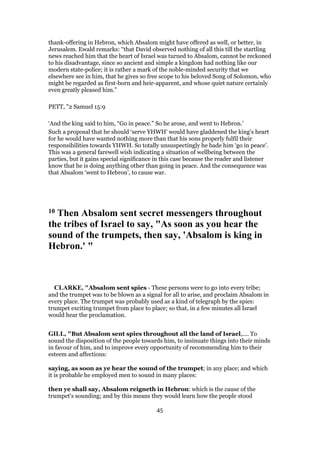
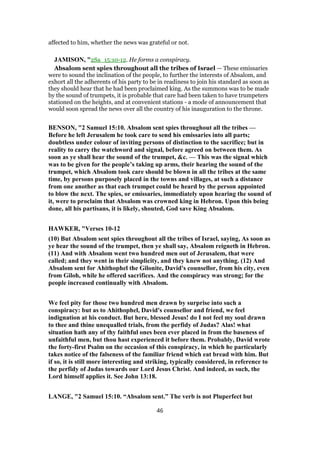
![Imperfect, since the sending out of emissaries might be synchronous with the
journey to Hebron, where Absalom’s accomplices had gotten everything in
readiness for proclaiming him king, else he could not have said: As soon as ye
hear the sound of the trumpet,[FN23] say, Absalom is become king in Hebron.
Absalom sent emissaries into all the tribes of Israel, to find out public opinion
and prepare for his attempt throughout the whole kingdom at the same time, he
having already gotten the favor of the people by the arts above-related, and
thrown his net over them. The emissaries had only to spread the net wider and
deeper, and then at the signal to draw it in and catch the people.
K&D 10-11, "When Absalom went to Hebron, he sent spies into all the tribes of
Israel to say, “When ye hear the sound of the trumpet, say, Absalom has become
king in Hebron.” We must suppose the sending the spies to have been
contemporaneous with the removal of Absalom to Hebron, so that ח ַל ְשׁ ַו is used quite
regularly, and there is no reason for translating it as a pluperfect. The messengers
sent out are called “spies,” because they were first of all to ascertain the feelings of
the people in the different tribes, and were only to execute their commission in places
where they could reckon upon support. The conspiracy had hitherto been kept very
secret, as we may see from the statement in 2Sa_15:11 : “With Absalom there had
gone two hundred men out of Jerusalem, invited (to the sacrificial festival), and
going in their simplicity, who knew nothing at all of the affair.” (ר ָב ָ ל־ ָⅴ ּאל: nothing
at all.)
PETT, "2 Samuel 15:10
‘But Absalom sent scouts throughout all the tribes of Israel, saying, “As soon as you
hear the sound of the trumpet, then you shall say, ‘Absalom is king in Hebron.’ ”
And it was from Hebron, where he was seemingly greeted as prospective king, (it is
apparent that a number of negotiation must have been going on meanwhile), that he
sent out messengers to selected groups with the news that when they heard the
blowing of the ram’s horns then they were to declare that ‘Absalom is king in
Hebron’. His coronation, when he would be anointed as king (2 Samuel 19:10), was
evidently imminent. This stress on ‘in Hebron’ might suggest that there was general
disaffection among many throughout the whole of Israel over David’s selection of a
Canaanite stronghold as his capital city, something which Absalom was taking
advantage of. Hebron at least was an ancient sanctuary of YHWH, and the home of
the Tabernacle, and ancient traditions die hard. Many would not have been pleased
with the change of emphasis to Jerusalem. Absalom was again playing the people for
all he was worth.
11 Two hundred men from Jerusalem had
accompanied Absalom. They had been invited as
guests and went quite innocently, knowing nothing
47](https://image.slidesharecdn.com/2samuel15commentary-160224024924/85/2-samuel-15-commentary-47-320.jpg)
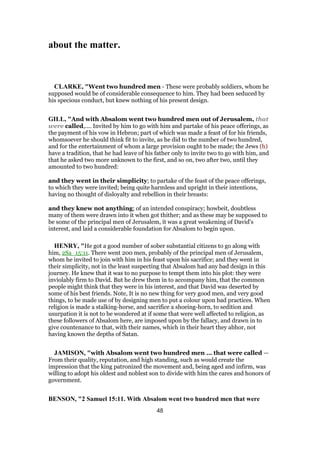
![called — That is, that were invited by him to feast with him on his sacrifice, and
were such as he had picked out as fit for his purpose; principal persons of the
city, no doubt, and of some reputation with the king and people. These he took
with him that they might give a countenance to his undertaking, and cause the
people at first to think that he was acting in all this by his father’s consent and
approbation, as being now aged and infirm, and willing to resign the kingdom to
his son. They went in their simplicity, and knew not anything — Of his design,
but only went to attend him, and pay him respect as the king’s son, who did them
the honour to invite them to a holy feast. It is no new thing for good men to be
made use of by designing men, to put a colour on ill practices.
LANGE, "2 Samuel 15:11. The two hundred men that accompanied him were
not “poor, dependent people,” which would certainly have excited surprise, but
courtiers such as ususually accompanied kings and kings’ sons on their journeys
without causing remark. That these men might be perfectly at their ease, under
the impression that they were going to a sacrificial feast at Hebron, and that the
real purpose might the better be concealed from David, nothing was said to them
of Absalom’s design; they knew “nothing at all” of the matter. Taken by surprise
in Hebron by the sudden proclamation of Absalom as king, they must have
appeared to the people at Jerusalem and elsewhere as part of the royal retinue.
[Bib-Com. points out the extreme secrecy of the affair as explaining David’s
ignorance of it, and also Absalom’s taste for large entertainments.—Tr.]. 2
Samuel 15:12. Ahithophel appears as Absalom’s secret counsellor in the
contriving of the conspiracy, and so as traitor to David, whose counsellor he was.
His native city Giloh was near and south of Hebron ( Joshua 15:51; Joshua
15:54). The text reads literally: “He sent Ahithophel from his city,” that Isaiah,
he caused him to come. Either this expression is to be regarded as a pregnant
one=“he sent and brought” (Keil), or we must change the vowel-points.[FN24]
Why Ahithophel abandoned David is not said; probably from dissatisfaction and
ambition. [Patrick: “And it is supposed by the Jews that Ahithophel was
incensed against David for abusing Bathsheba, whom they take to have been his
grand-daughter, she being the daughter of Eliam (11:3), and Eliam being the son
of Ahithophel (23:34).”—So Blunt, Coincidences, Part II. (ix.)—Tr.]—No doubt
he had been slyly working at Giloh, and had prepared everything for
proclaiming Absalom. The conspiracy grew rapidly, and the people came to
Absalom in constantly increasing numbers. It is noticeable that it is in the tribe
of Judah that this defection from David is consummated. The elements of this so
astonishingly successful insurrection of Absalom were David’s grievous sins, his
weakness towards Amnon and Joab, the lacks of the royal government and the
consequent dissatisfaction among the people. [The expression: “while he offered
bloody offerings” is difficult. If the subject be Ahithophel, it does not appear why
his offering should be mentioned; or if, as is more probable, the subject is
Absalom, the reason for his sending for Ahithophel while he was offering is not
clear; we should rather have expected the latter to be present at the beginning of
the solemn sacrifice that was to pledge the conspirators. As the text stands, it
cannot be rendered: “he sent for Ahithophel to be present when he offered,” nor:
“and while he sacrificed, the conspiracy grew strong,” though something like one
of these renderings seems to be the meaning. The text is discussed in “Text, and
49](https://image.slidesharecdn.com/2samuel15commentary-160224024924/85/2-samuel-15-commentary-49-320.jpg)
![Gram.”—Grotius refers to the similar procedure of Civilis (pledging
conspirators at a feast), Tacit, Hist. IV:14.—Tr.]
ELLICOTT, "(11) Went in their simplicity.—The two hundred guests whom
Absalom had invited to take part with him in his sacrifices, were doubtless
prominent and influential citizens of Jerusalem. That they were entirely ignorant
of Absalom’s purposes shows the extreme secrecy with which the affair was
managed. Absalom, no doubt, hoped when he once had them at Hebron, to
secure them for his side, or, failing this, forcibly to prevent their opposition. In
any case it would appear to the people that they were with him, and he would
thus secure additional prestige.
PETT, "2 Samuel 15:11
‘And with Absalom went two hundred men out of Jerusalem, who were invited,
and went in their simple innocence, and they knew nothing.’
Absalom took with him ‘two hundred men’ out of Jerusalem, men who were in
simple innocence of what his motives were. Whether we take the two ‘hundreds’
as strictly numerical, or see it as indicating two family/clan or other groupings
(Israelites and Geshurites?), such an invitation indicated that this was being seen
as a very special occasion. And if it was so they were being taken in order to allay
suspicions. They would, however, no doubt have been selected because they were
known to be his ‘friends’.
12 While Absalom was offering sacrifices, he also sent
for Ahithophel the Gilonite, David's counselor, to
come from Giloh, his hometown. And so the
conspiracy gained strength, and Absalom's following
kept on increasing.
BARNES, "Ahithophel - It has been with great probability supposed that
Ahithophel was estranged from David by personal resentment for his conduct in the
matter of Bath-sheba and Uriah (see 2Sa_11:3).
While he offered sacrifices - Rather, that Absalom sent for Ahithophel to be
present when he offered the sacrifices; the intention being that all who partook of the
sacrifice should be bound together to prosecute the enterprise. Absalom, too, would
take advantage of the excitement of the great feast to inflame the ardour of the
50](https://image.slidesharecdn.com/2samuel15commentary-160224024924/85/2-samuel-15-commentary-50-320.jpg)
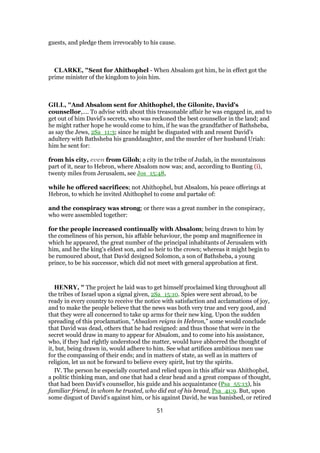
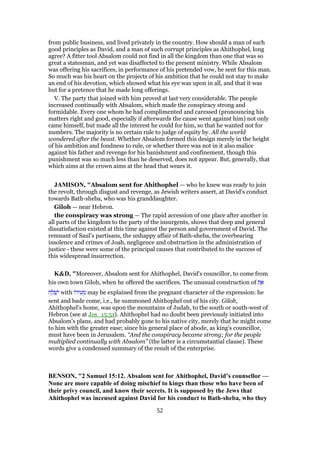
![think, was his grand-daughter, being the daughter of Eliam, 2 Samuel 11:3, and
Eliam the son of Ahithophel, 2 Samuel 23:34. It doubtless must have been matter
of great surprise and inexpressible affliction to David, to find the two men, whom
of all others he seems to have most loved and confided in, combining against him,
and compassing his death, Absalom and Ahithophel, his son and his counsellor.
While he offered sacrifices — Or, rather, after he had offered sacrifices: for it
seems he sent for him while he sat at dinner. And the conspiracy was strong —
Ahithophel was too cunning to discover himself till he saw all things favourable
and prosperous on the part of Absalom: and they both very well judged that his
accession to the conspiracy, in those circumstances, was the likeliest means to
ensure its success. For the people increased continually — Most of whom, it is
probable, intended no harm at first, perhaps not even to divest David of his
crown and dignity, much less to take away his life; but only to substitute
Absalom as a coadjutor to him, for the executing of the royal authority during
David’s life, and to be his successor after his death. However, it is evident they
did proceed so far, at last, as to design to kill David for their own greater
security. For so Ahithophel advised, and they all consented to it, 2 Samuel 17:2; 2
Samuel 17:4; which shows how dangerous it is to go out of the right way; for we
do not know down what horrid precipices we may fall afterward. And it may
serve as a warning to us never to begin any thing that is wrong, which may lead
us to commit that in the issue which we abhorred at the first, when we find we
cannot be safe in one wickedness, unless we commit a greater.
COFFMAN, ""He sent for Ahithophel the Gilonite, David's counselor, from his
city Giloh" (2 Samuel 15:12). Ahithophel was a very wise man, and if Absalom
had possessed enough intelligence to follow his counsel, he might easily have
triumphed over David.
"From his city Giloh" (2 Samuel 15:12). Some have supposed this place was
south or southwest of Hebron, but Willis identified it with, "The modern
Khirbert Jala approximately five miles northwest of Hebron."[12] It is very
significant that Ahithophel was available at the nearby city of Giloh when
Absalom called for him, instead of being in the city of Jerusalem where he
belonged as a confidential advisor of King David. From this Keil very logically
concluded that, "Ahithophel had been previously initiated into Absalom's plans
and had gone to his native city, merely that he might go to Absalom with greater
ease."[13] It appears from this that Ahithophel himself might have been one of
the principal architects of the rebellion. The reason usually assigned and which
we mentioned earlier, is that Ahithophel was the grandfather of Bathsheba and
that he hated David for David's treatment of her and for his murder of her
husband Uriah. Of course, there could have been some truth in this.
However, Ahithophel was far too wise a man to have joined the conspiracy
unless he had been quite sure of its success; and, no doubt, it would have been a
success if his advice had been followed. But he knew that if David was given time
to gather his forces the coup would fail; and when he saw that Absalom rejected
his advice, he promptly committed suicide.
53](https://image.slidesharecdn.com/2samuel15commentary-160224024924/85/2-samuel-15-commentary-53-320.jpg)
![But if the coup had been successful, did not Ahithophel foresee that Bathsheba
and her son Solomon, Ahithophel's great-grandson, would have been killed?
"Even if Bathsheba had been spared (through Ahithophel's influence), there is
no way that Absalom would have refrained from murdering Solomon."[14]
From these considerations we still find it very difficult to imagine why
Ahithophel consented to aid Absalom.
AND ALL THE WORLD WONDERED AFTER THE BEAST (Revelation 13:3)
To this writer, it seems that the above unrelated text from Revelation is an
appropriate designation of the popularity that came to Absalom, as related in 2
Samuel 15:13 below.
ELLICOTT, "(12) Sent for Ahithophel.—Giloh, the city of Ahithophel, was one
of the groups of towns just south of Hebron (Joshua 15:51), and Ahithophel may
have gone there in readiness to be summoned by Absalom. Why he deserted
David does not appear. It has been conjectured that he was aggrieved at David’s
treatment of Bath-sheba, who is supposed to have been his granddaughter. Bath-
sheba’s father was Eliam (2 Samuel 11:3) and Ahithophel had a son Eliam (2
Samuel 23:34), but there is no evidence that these were the same, and if they had
been, Ahithophel probably would have felt honoured rather than aggrieved that
his daughter should have been made queen. It is more likely that Ahithophel and
many others of the tribe of Judah were alienated because, in the rapidly growing
empire of David, their relative importance was of necessity constantly
diminishing. It is noteworthy that the rebellion was cradled in Judah, and seems
to have found there its chief strength.
There is a difference of opinion whether Psalms 41 was written on this occasion;
but its ninth verse certainly applies very pointedly to Ahithophel; and his
conduct, both in his treachery and his suicide, forms a striking parallel to that of
Judas, to whom this verse is applied in John 13:18. Many writers also consider
that Psalms 55 was composed with reference to Ahithophel.
While he offered sacrifices.—Absalom had arranged these, apparently with
pomp and circumstance, to continue through several days. This gave time for the
conspiracy to gain strength, and the accompanying feasting allowed Absalom an
excellent opportunity for using his popular arts, and with such success that “the
people increased continually with Absalom.”
PETT, "David Learns Of The Rebellion And Flees Jerusalem While Absalom
Enlists The Services of Ahithophel (2 Samuel 15:12-31).
Once messengers had gone out throughout Israel, and preparations had begun in
54](https://image.slidesharecdn.com/2samuel15commentary-160224024924/85/2-samuel-15-commentary-54-320.jpg)
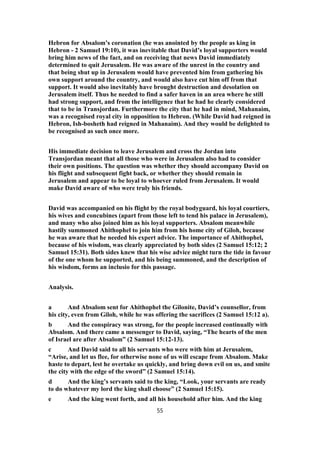
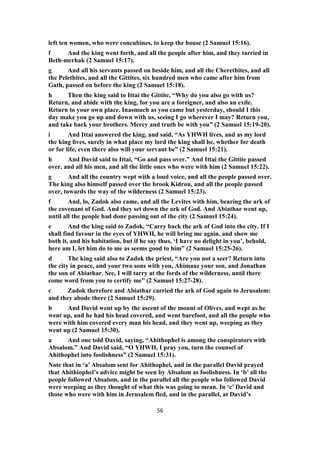
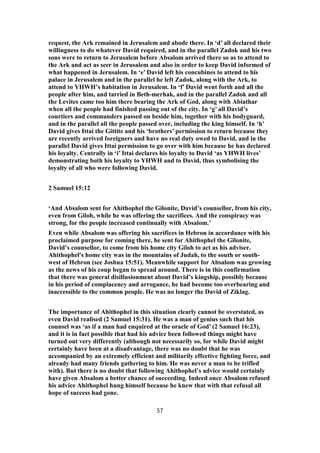
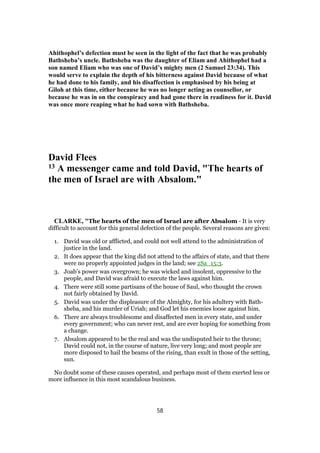
![GILL, "And there came a messenger to David,.... Perhaps one of the two
hundred that went with Absalom, ignorant of his design; which, when discovered, he
disapproved of, and got away from him, and came to David, and informed him how
things were:
saying, the hearts of the men of Israel are after Absalom; to make him king.
HENRY, "Here is, I. The notice brought to David of Absalom's rebellion, 2Sa_
15:13. The matter was bad enough, and yet it seems to have been made worse to him
(as such things commonly are) than really it was; for he was told that the hearts of
the men of Israel (that is, the generality of them, at least the leading men) were after
Absalom. But David was the more apt to believe it because now he could call to mind
the arts that Absalom had used to inveigle them, and perhaps reflected upon it with
regret that he had not done more to counterwork him, and secure his own interest,
which he had been too confident of. Note, It is the wisdom of princes to make sure of
their subjects; for, if they have them, they have their purses, and arms, and all, at
their service.
JAMISON, "2Sa_15:13-37. David flees from Jerusalem.
K&D, 13-14, "David's flight from Jerusalem. - 2Sa_15:13, 2Sa_15:14. When this
intelligence reached David, “The heart of the men of Israel is after Absalom” (ר ַהፍ הָי ָ,ה
as in 2Sa_2:10, to be attached to a person as king; see at 1Sa_12:14), he said to his
servants that were with him in Jerusalem, “Arise, let us flee, for there will be no
escape for us from Absalom! Make speed to depart, lest he overtake us suddenly,
and drive the calamity (the judgment threatened in 2Sa_12:10-11) over us, and
smite the city with the edge of the sword.” David was perhaps afraid that Jerusalem
might fall into Absalom's power through treachery, and therefore resolved to fly as
speedily as possible, not only in order to prevent a terrible massacre, but also to give
his own faithful adherents time to assemble.
CONSTABLE, "David's flight from Jerusalem 15:13-37
The people of Israel had formerly given the kingdom to David as a gift (2 Samuel
5:1-3), but now they took that gift from him (2 Samuel 15:13). [Note: Gunn,
"David and . . .," p. 22.] David knew that Absalom was popular with the people.
Evidently he fled Jerusalem to save his own life and to spare the capital from
destruction. Perhaps Absalom planned to destroy David's capital as well as to
kill the king and reassert Judean supremacy. Clearly David planned to return to
Jerusalem (2 Samuel 15:16). He was fleeing from an attack, not going into exile.
The Cherethites and Pelethites were David's bodyguard. The 600 men from Gath
(2 Samuel 15:18) were probably mercenary soldiers. These foreigners were loyal
to David even when his own son deserted him.
"Ancient kings quite often preferred to employ foreign bodyguards, since they
were unlikely to be affected by local political considerations or won over by local
political factions." [Note: Payne, p. 231.]
David later repaid Ittai, another former resident of Gath, for his loyalty by
59](https://image.slidesharecdn.com/2samuel15commentary-160224024924/85/2-samuel-15-commentary-59-320.jpg)
![making him commander of one-third of his army (2 Samuel 18:2). David urged
Ittai to return to Jerusalem and to remain loyal to him there (2 Samuel 15:19),
but Ittai insisted on accompanying the king. Ittai's commitment to David (2
Samuel 15:19-22) recalls Ruth's commitment to Naomi (Ruth 1:16-17). David
crossed the Kidron Valley immediately east of Zion and moved up the Mount of
Olives that lay on the other side of the valley. In this he anticipated the
movement of his descendant, Jesus Christ, who also crossed the Kidron Valley to
pray on Mt. Olivet during His passion (John 18:1).
At this time there were two leading priests in Israel: Zadok (who was also a
prophet, 2 Samuel 15:27) and Abiathar. Probably Zadok was responsible for
worship in Jerusalem where David built a new structure to house the ark.
Abiathar seems to have functioned for many years as David's personal chaplain.
Earlier Zadok had been in charge of the Gibeon sanctuary (1 Chronicles
16:39-42). God's "habitation" (2 Samuel 15:25) most likely refers to the new tent
David had recently completed in Jerusalem (cf. 1 Chronicles 15:1). These facts
suggest another reason for Absalom's rebellion and the support he enjoyed.
Many of the Israelites probably considered David's projects of building a new
tabernacle and bringing the ark into Jerusalem inappropriate, since Jerusalem
was a formerly Canaanite stronghold. Many other people may have shared
Michal's reaction (2 Samuel 6:16-20). [Note: Ibid., p. 185.]
David's complete submission to God's authority over his life is admirable (2
Samuel 15:26). The phrase "the fords of the wilderness" (2 Samuel 15:28)
probably refers to the place people forded the Jordan River near the wilderness
of Judah (cf. 2 Samuel 17:22). David did not believe superstitiously that the
presence of the ark would ensure his victory (cf. 1 Samuel 4:3).
David trudged up the Mount of Olives, attired for mourning (2 Samuel 15:30),
praying as he wept (2 Samuel 15:31). On Mt. Olivet David was still only a few
hundred yards from the City of David. It rises about 200 feet above the city to its
east. Walking barefoot (2 Samuel 15:30) symbolized "the shameful exile on
which he is now embarking (cf. Isaiah 20:2-3; cf. similarly Micah 1:8)." [Note:
Youngblood, p. 997.] David's friend (i.e., counselor) Hushai came from a family
that evidently lived on Ephraim's southern border between Bethel and Ataroth
(Joshua 16:2). [Note: Cf. Carl G. Rasmussen, Zondervan NIV Atlas of the Bible,
p. 227.] He was probably quite old.
Chapter 15 teaches us a lot about friendship. Absalom is the negative example,
and David's supporters as he left Jerusalem are the positive ones. David lost
Absalom as a friend because he failed to reach out to him in genuine forgiveness.
David won the friendship of many others in Israel because he had a heart for
God that expressed itself in lovingkindness for people (cf. Matthew 22:37-39).
This made people love David, and we see the marks of their friendship in their
dealings with David in this chapter. The king's servants modeled true service by
offering to do whatever David needed them to do (2 Samuel 15:15-18). Ittai
60](https://image.slidesharecdn.com/2samuel15commentary-160224024924/85/2-samuel-15-commentary-60-320.jpg)
![expressed his friendship by being a companion to David (2 Samuel 15:19-23).
Zadok and Abiathar became informants and made sure their friend had the
information he needed to guarantee his welfare (2 Samuel 15:24-29). Hushai was
willing to hazard his own safety to defend David in the presence of his enemies (2
Samuel 15:30-37). These people proved to be "sheltering trees" [Note: Samuel
Taylor Coleridge, "Youth and Age," in Poems That Live Forever, p. 256.] for
their friend in his hour of need.
"Meanwhile David showed a commendable attitude very much in contrast to
Absalom's arrogance. He was completely willing to submit to God's will (2
Samuel 15:25 f.), whatever that might prove to be. Such willingness to surrender
leadership at the right time is another hallmark of good leadership." [Note:
Payne, p. 232.]
HAWKER, "Verse 13-14
(13) ¶ And there came a messenger to David, saying, The hearts of the men of
Israel are after Absalom. (14) And David said unto all his servants that were
with him at Jerusalem, Arise, and let us flee; for we shall not else escape from
Absalom: make speed to depart, lest he overtake us suddenly, and bring evil
upon us, and smite the city with the edge of the sword.
David was a man of great personal bravery, wherefore then did he wish to flee?
No doubt he saw the hand of the Lord in the affliction. God had said, I will raise
up evil out of thine own house. 2 Samuel 12:11. Reader! that affliction which
comes immediately from the Lord, and as the correction of sin, throws down self-
confidence, and makes men cowards. It is sweet to see the hand of him that
corrects however, because as his name is, so is his mercy.
PINK, "There are few incidents in the checkered life of David more pathetic
than the one which is now to engage our attention, illustrating as it also does the
providential ups and downs and the alternating spiritual prosperity and
adversity which is the lot of God’s people on this earth. All is not unclouded
sunshine with them, nor is it unrelieved gloom and storm. There is a mingling of
both; joys and sorrows, victories and defeats, assistance from friends and
injuries from foes, smiles from the Lord’s countenance and the hidings of His
face. By such changes opportunities are afforded for the development and
exercise of different graces, so that we may, in our measure, "know how to be
abased and how to abound . . . both to be full and to be empty" (Phil 4:12); and
above all, that we may, amid varying circumstances, prove the unchanging
faithfulness of God and His sufficiency to supply our every need.
David was called to leave the lowly plains of Bethlehem to participate in the
honors of Saul’s palace. From tending the flock he became the conqueror of
Goliath and the popular hero of Israel. But soon Saul’s friendship was changed
to enmity, and David had to flee for his life, and for many weary months he was
hunted as a partridge on the mountains. Subsequently his fortunes were again
greatly altered, and from being an outcast he was crowned king of Israel. Then
he was enabled to capture Jerusalem, the stronghold of Zion, which became "the
61](https://image.slidesharecdn.com/2samuel15commentary-160224024924/85/2-samuel-15-commentary-61-320.jpg)
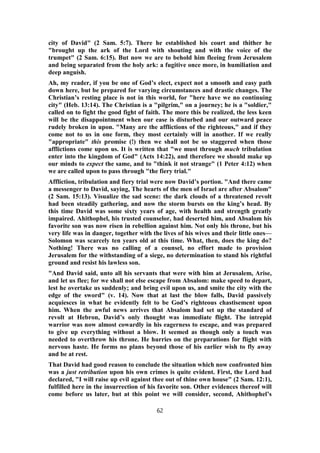
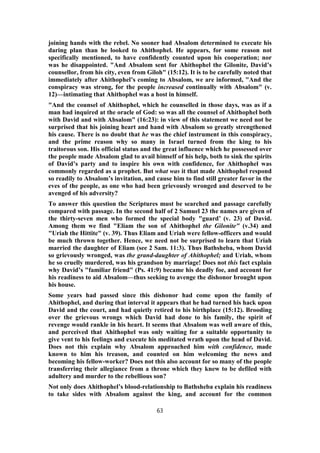
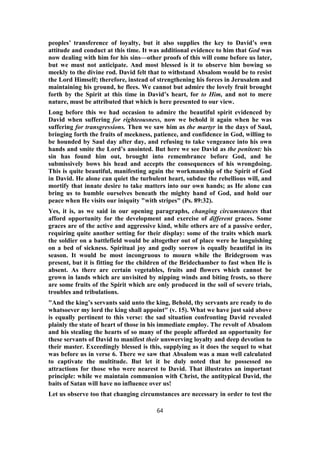
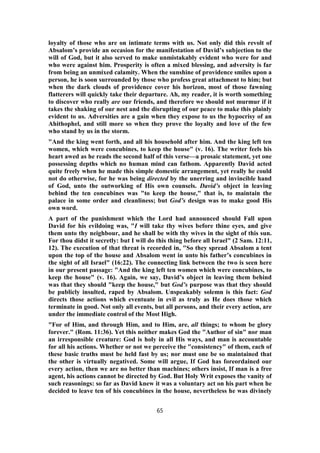
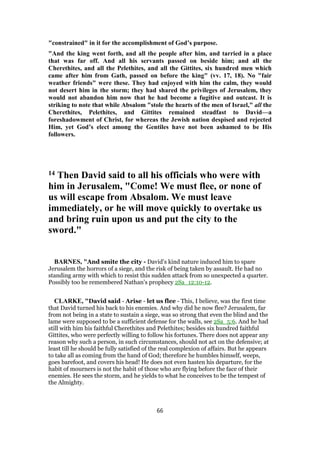
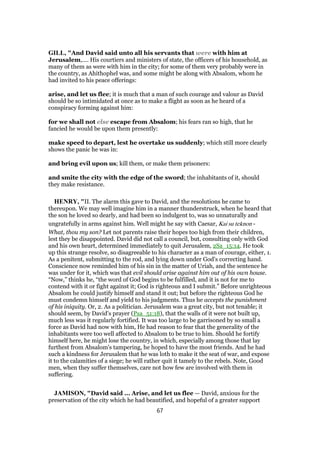
![throughout the country, wisely resolved on leaving Jerusalem.
BENSON, "2 Samuel 15:14. David said, Arise, and let us flee — As soon as he
had received information of what had passed, he saw the danger was instant, and
took his measures accordingly. He knew Absalom would lose no time to
accomplish his design, and that the nature of it required him to strike home at
once. David therefore orders his servants, soldiery, and friends, to depart from
Jerusalem immediately. For, though the fort of Zion was strong, and he might
have defended himself there for some time, yet he had not laid in provisions for a
long siege; and, if he had been once besieged there, Absalom would have got
speedy possession of his whole kingdom, whereas, if he marched abroad, he
might raise a considerable army for his defence. Besides, the greatest part of
Jerusalem could not be well defended against an enemy. And if it could, “he did
not care to expose a favourite city, built by himself, and the residence of the
tabernacle of God, to all the evils incident to sieges, and almost inseparable from
them. Nor, perhaps, did he incline to trust the inhabitants of a place so long
exposed to the taint of Absalom’s temptations.” This, some think, appears from
the 55th Psalm, which, they suppose, was meditated and poured out in prayer to
God upon the discovery of Absalom’s conspiracy. And from thence it is evident
that he had discerned the seeds and workings of a conspiracy in the city, and that
Ahithophel was at the bottom of it: and not only so, but that David foresaw his
sudden and sad end. — Delaney. For we shall not else escape from Absalom —
He was well acquainted with the young man’s impetuosity, and the madness of
the people, and therefore judged that the only method to be pursued, in order to
safety, was to give way to the fury of the flood, and not attempt to stem it in the
fulness of its overflowing.
LANGE, "2 Samuel 15:14. Up! let us flee. David’s immediate flight is to be
explained (according to the reason that he himself here gives) by the fact that
seized not with momentary fear (Thenius), but doubtless with sudden terror at
the unexpected revolution, he yet sees that the fulfilment of Nathan’s prophecy of
approaching “misfortune” (12:10, 11) is now beginning, that the punishment
cannot be warded off, and that to stay in Jerusalem will only occasion a storming
of the city with much bloodshed, which he wishes to avoid. “Against an
insurrection so vigorous, and yet so thoroughly groundless and unintelligible, the
best defence was to withdraw quietly and try to gain time; the first fright happily
gotten over, sober thought would soon return in many places” (Ewald). [How far
Jerusalem was now in condition to stand a siege (Zion was probably fortified), or
whether David had a well-organized standing army, and how much of the army
Absalom carried off, we do not know; David’s forces seem not to have received
any important addition after he left the city. Two reasons for leaving Jerusalem
would be: to spare the city the horrors of a siege, and to gain the advantage of his
military skill and of the discipline of his tried warriors in the open country.—
Tr.]—[ 2 Samuel 15:15. David’s servants (soldiers) declare themselves ready to
obey his commands—a comfortable faithfulness in the midst of general
defection.—Tr.]
68](https://image.slidesharecdn.com/2samuel15commentary-160224024924/85/2-samuel-15-commentary-68-320.jpg)
![COFFMAN 14-18, ""Lest he ... smite the city with the edge of the sword" (2
Samuel 15:14). Some have criticized David's forsaking Jerusalem; but, in all
probability, it was precisely that maneuver that saved his life and his throne. If
Absalom had promptly surrounded Jerusalem, David would have been trapped
and eventually defeated; but in the open country Absalom had nothing that
could stand against David and his men of war. "The fact that David's loyal
followers did not question his decision to leave Jerusalem indicates that his
decision was not based upon cowardice but upon the cold calculations of an
experienced military specialist."[15]
Besides that, David loved Jerusalem and did not wish to see it subjected to the
horrors of a siege. Also, Caird suggested that, "David must have been afraid of
treachery from within Jerusalem."[16] In the terrible sorrows of this rebellion,
David's character as "a man after God's own heart" is once more manifest,
especially in the beautiful, heart-moving Psalms which he wrote during these
hours of shame and grief.
"The six hundred Gittites" (2 Samuel 15:18). Some have questioned the identity
of these; but Keil stated that, "It is dear enough that these are the six hundred
old companions in arms of David who gathered around him during the days of
his flight from Saul, who emigrated with him to Gath, and later to Ziklag."[17]
These were the skilled soldiers who were capable of defeating an army ten times
their size. "Such seasoned troops would find Absalom's levies an easy prey."[18]
As a matter of fact, when it finally came down to fighting, Absalom lost tens of
thousands of his troops.
"Passed on before the king" (2 Samuel 15:18). "This refers to their crossing the
brook Kidron east of Jerusalem."[19]
PETT, "2 Samuel 15:14
‘And David said to all his servants who were with him at Jerusalem, “Arise, and
let us flee, for otherwise none of us will escape from Absalom. Make haste to
depart, lest he overtake us quickly, and bring down evil on us, and smite the city
with the edge of the sword.” ’
On receipt of this news David recognised that his wisest course would be to leave
Jerusalem, where he could have become entrapped by the arrival of Absalom’s
forces, and move immediately into an area over the Jordan which had not been
so affected by Absalom’s propaganda. From there he could then begin to
organise his own counter measures. Transjordan was regularly the place of
refuge for those who fled the central part of Israel, for the Transjordanians
were, to some extent at least, a unit in themselves and historically their loyalty
was not so tied in with the tribes on the western side of the Jordan. To quite a
large extent they saw themselves as having their own agenda. And they would
have been delighted at the thought that Mahanaim was being recognised once
69](https://image.slidesharecdn.com/2samuel15commentary-160224024924/85/2-samuel-15-commentary-69-320.jpg)
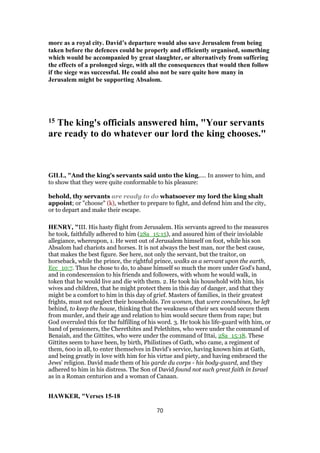
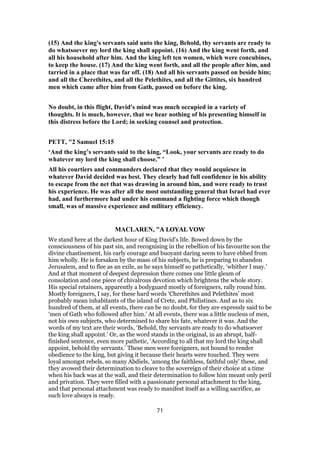
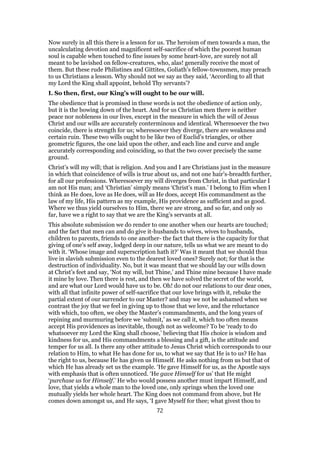
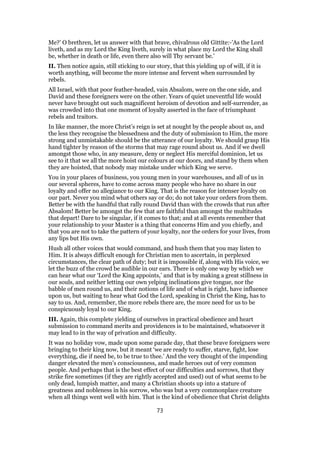
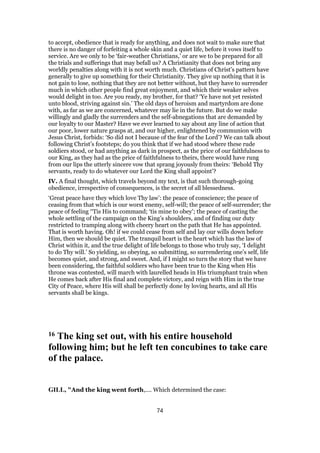
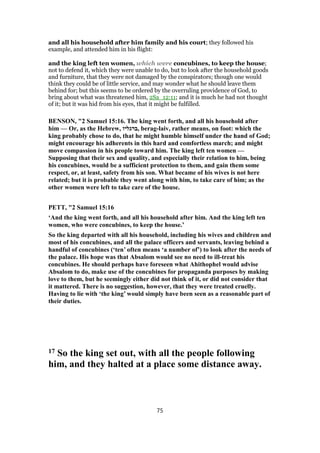
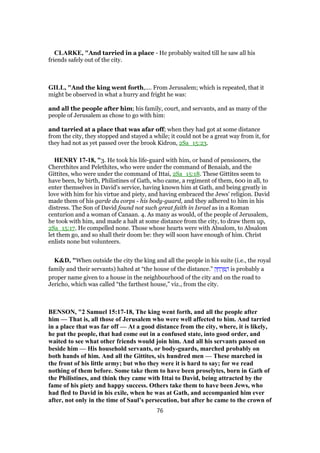
![Israel and Judah.
LANGE, "2 Samuel 15:17. “All the people,” all persons attached to the court,
including the numerous body of servants = “the whole household” ( 2 Samuel
15:16). They halted at “the farthest (or far) house” [Eng. A. V.: “a place that was
far off”] on the road to Mount Olivet, but this side the Kidron. So the German
phrase “the last cent” (der letzte Heller) used as a proper name to designate a
farm lying at the extremity of a region. Probably this designation had already
become a proper name among the people. [Bib. Com.: “very likely a fort
guarding the passage of the Kidron.” Others write: Beth-merhak.—Tr.]
PETT, "2 Samuel 15:17
‘And the king went forth, and all the people after him, and they tarried in Beth-
merhak.’
The king not only went forth with his household, but also with ‘all the people’,
that means, of course, all his followers in Jerusalem, not stopping until they came
to Beth-hermack (‘the house of the distances’) where they organised themselves
and regrouped. Beth-hermack may have been the name given to the last house in
the environs of greater Jerusalem which was seen as indicating its boundary. It
would be the natural place to wait for all who wanted to join them in their flight
as they arrived from different parts of the city and the countryside round about.
18 All his men marched past him, along with all the
Kerethites and Pelethites; and all the six hundred
Gittites who had accompanied him from Gath
marched before the king.
BARNES, "Passed on - Rather, “crossed” the Brook Kidron, as in 2Sa_15:22-23.
Gittites - During David’s residence in the country of the Philistines he attached
such a band to himself; and after the settlement of his kingdom, and the subjugation
of the Philistines, the band received recruits from Gath, perhaps with the king of
Gath’s consent. They were now under the command of Ittai the Gittite, a foreigner
2Sa_15:19, and “his brethren” 2Sa_15:20. The number 600 probably indicates that
this band or regiment of Gittites had its origin in David’s band of 600 1Sa_23:13;
1Sa_27:2. They were at first, it is likely, all Israelites, then Gittites mixed with
Israelites, and at last all Gittites.
77](https://image.slidesharecdn.com/2samuel15commentary-160224024924/85/2-samuel-15-commentary-77-320.jpg)
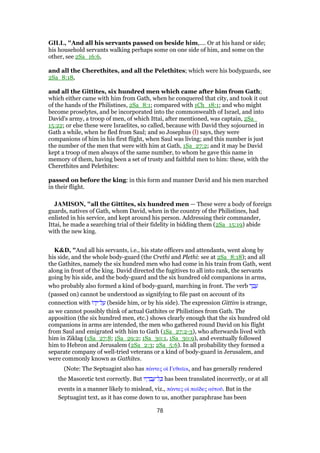
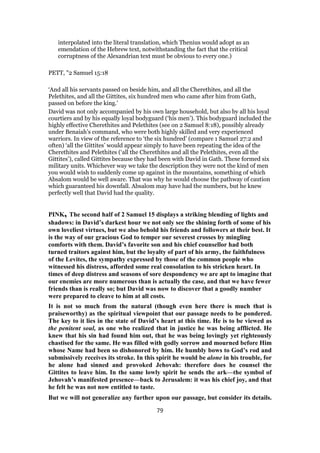
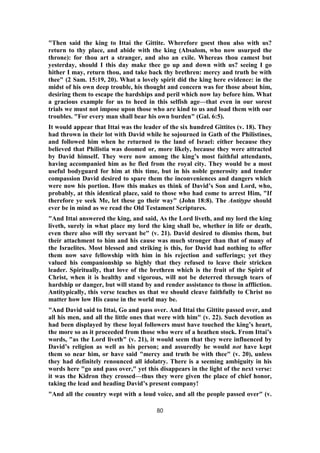
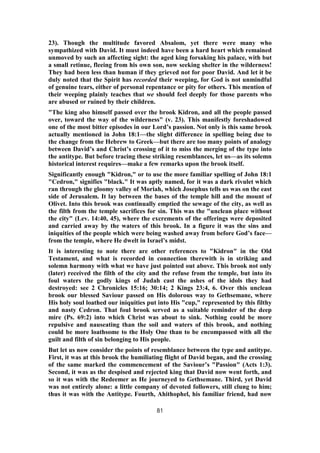
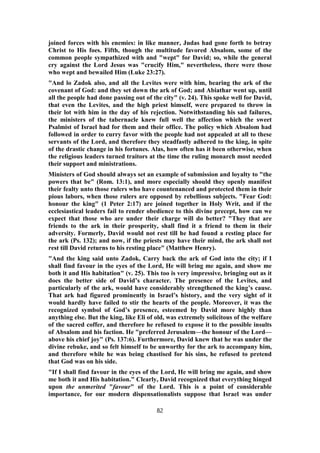
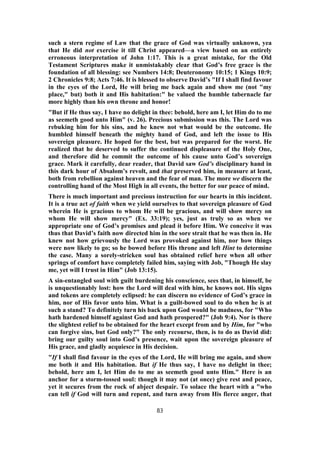
![we perish not?" (Jonah 3:9), or a "Who can tell whether God will be gracious to
me?" (2 Sam. 12:22), is far better than giving way to a spirit of hopelessness.
"Who knoweth if He will return and repent, and leave a blessing behind Him"
(Joel 2:14): there the soul must abide until more light from above break forth
upon it.
ELLICOTT, "(18) Cherethites . . . Pelethites.—See Note on 2 Samuel 8:18.
Gittites.—This word in its form would naturally mean men of Gath, and it has
therefore been understood by some commentators of a body of Philistines in
David’s service. But the term is distinctly explained here as meaning the “six
hundred men which came after him from Gath,” and called “Gittites” for that
reason, a body of men with whom the previous history of David has made us
very familiar. They had gathered to him during his outlawry (1 Samuel 22:1-2),
had been with him at Keilah (1 Samuel 23:13), in the wilderness of Paran (1
Samuel 25:13), and at Gath (1 Samuel 27:3), “came after him from Gath” to
Ziklag, and shared with him in his life and exploits there (1 Samuel 27:8; 1
Samuel 29:2; 1 Samuel 30:1-9), and went up with him to Hebron (2 Samuel 23),
and thence to Jerusalem (2 Samuel 5:6). They are generally supposed to have
afterwards constituted the body of “heroes” or “mighty men,” to whom frequent
reference is made (2 Samuel 10:7; 2 Samuel 16:6; 2 Samuel 20:7; 1 Kings 1:8).
The Vatican LXX. here, as often, adds considerably to the text.
LANGE, "2 Samuel 15:18. David having halted here with his immediate retinue
(of his household), caused first all his servants to pass by at his side (ָדוֹיל־ַ,)ﬠ then
his body guard and six hundred Gittites (who had followed him from Gath) to
pass before him, so that the latter formed the vanguard. On the “Cherethites and
Pelethites” comp8:18. As the “six hundred men that followed him from Gath”
are called “all the Gittites,” they must be those six hundred faithful companions-
in-arms that gathered about David during Saul’s persecution ( 1 Samuel 22:2; 1
Samuel 23:13; 1 Samuel 25:13), went with him to Gath ( 1 Samuel 27:2 sq.) and
settled with him in Ziklag ( 1 Samuel 27:8; 1 Samuel 29:2; 1 Samuel 30:1; 1
Samuel 30:9). Thence they marched with him to Hebron (2:3) and Jerusalem
(5:6). They are the same that are called “Gibborim” [heroes, mighty men] in16:6,
and appear as his military escort. Comp20:7; 23:8 sqq, where the Gibborim seem
to be identical with these. “They very probably formed, from the time that David
went to reside at Jerusalem, a special body, known as ‘the Gibborim,’ kept
always in full number (hence here also, six hundred), living in barracks at
Jerusalem (see Appendix to the Books of Kings, § 7), employed only in the most
important undertakings (10:7; 20:7, 9) the Old Guard, as it were, who here also
will protect the retreat of their lord with their stout, faithful bodies” (Thenius).
They are here called “the Gittites” because they were so called by the people, as
having followed David “from Gath on” (Keil). There is no necessity for read-
Gibborim instead of Gittites (Thenius), especially as all the versions have the
latter. [This reading is discussed in “Text. and Gram.” Some hold these
“Gittites” to be foreigners (Philistines) that had entered David’s service, as we
know many foreigners did; and this is probable, if we retain the present text. But
84](https://image.slidesharecdn.com/2samuel15commentary-160224024924/85/2-samuel-15-commentary-84-320.jpg)
![that the Gibborim were called “Gittites” (Keil) is not probable, and as there is no
account of such a body of Philistines having followed David from Gath (that
Isaiah, when he lived there), there is strong reason for reading Gibborim instead
of Gittites.—Tr.]
19 The king said to Ittai the Gittite, "Why should you
come along with us? Go back and stay with King
Absalom. You are a foreigner, an exile from your
homeland.
CLARKE, "Thou art a stranger, and also an exile - Some suppose that Ittai
was the son of Achish, king of Gath, who was very much attached to David, and
banished from his father’s court on that account. He and his six hundred men are
generally supposed to have been proselytes to the Jewish religion.
GILL, "Then said the king to Ittai the Gittite,.... Who was over the band of
Gittites, the six hundred men, 2Sa_15:22,
wherefore goest thou also with us? one should think the king should not have
discouraged any from joining and following him, when his numbers were not very
large, and the in such fear on account of Absalom:
return to this place; to Jerusalem, where his station was:
and abide with the king; with Absalom, who set himself up for king, and whom
the people perhaps had proclaimed as such in Hebron, where the conspiracy began:
for thou art a stranger, and also an exile; not a native of Israel, but of another
nation, and at a distance from it, and therefore not altogether under the same
obligations to attend David in his troubles as others were; and by this it seems that
he was a Gittite by nation, whatever the six hundred men were, and rather favours
the first sense given of them in 2Sa_15:18.
HENRY 19-20, "IV. His discourse with Ittai the Gittite, who commanded the
Philistine-proselytes.
1. David dissuaded him from going along with him, 2Sa_15:19, 2Sa_15:20. Though
he and his men might be greatly serviceable to him yet, (1.) He would try whether he
was hearty for him, and not inclined to Absalom. He therefore bids him return to his
post in Jerusalem, and serve the new king. If he was no more than a soldier of
fortune (as we say), he would be for that side which would pay and prefer him best;
and to that side let him go. (2.) If he was faithful to David, yet David would not have
85](https://image.slidesharecdn.com/2samuel15commentary-160224024924/85/2-samuel-15-commentary-85-320.jpg)
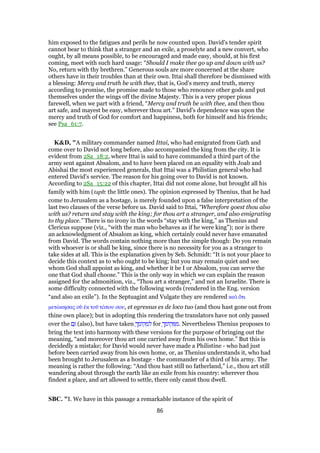
![truepatriotism, all the more remarkable because, in one sense, patriotism is not quite
the word to apply to Ittai, for he was a stranger and an alien, though a naturalised
Israelite. In him we have a singular instance of that devotion to a person which will
always be the leading characteristic of the Christian life. The legalist may be devoted
to a system; the moralist may be devoted to an idea; the real Christian will be devoted
to a Person, to the person of a living Christ.
II. Ittai was the kind of man that David wanted, and he is the kind of man that Christ
wants now. There are many people ready enough to make the Lord Jesus Christ a
kind of stepping-stone to help them into heaven. If they can make a convenience of
Him and He can serve their purpose in a dying hour, it is all very well. It is not such
as these the Lord wants. The "citizens of heaven" are men who are partakers of their
Master’s nobility.
III. It was the fact that David had received him as an exile that first bound Ittai’s
heart to him. We also are strangers and exiles. Christ gives us a home. Our adoption
into His family should be a motive power which will bear us through all the shocks of
the battle of life and make us "more than conquerors through Him that loved us."
W. Hay Aitken, Mission Sermons, 1st series, p. 168.
BENSON, "2 Samuel 15:19-20. Then said the king to Ittai the Gittite, &c. — He
seems to have been the commander of those six hundred men before mentioned.
And the Jews make him the son of Achish, king of Gath, who, they say, out of
religion and friendship came to David. Return to thy place — To Jerusalem,
where thy place of residence is. And abide with the king —
With Absalom, king by usurpation. For thou art a stranger and an exile — Not
much concerned in our affairs, and therefore thou oughtest not to be involved in
our troubles. And, as a stranger, thou mayest hope to be civilly treated by
Absalom. Whereas thou camest but yesterday — That is, very lately; should I
this day make thee go up and down with us? — Should I unsettle thee again so
soon? Seeing I go whither I may — Or, I know not whither, having now no
certain dwelling-place. Take back thy brethren — Thy countrymen the Gittites.
Mercy and truth be with thee — Since I am now unable to recompense thy
kindness and fidelity to me, my hearty prayer to God is, that he would show to
thee his mercy, in blessing thee with all sorts of blessings, and his faithfulness in
making good all these promises which he hath made, not to Israelites only, but to
all true-hearted proselytes, such as thou art.
COFFMAN, "The picture that emerges here is that of David standing by the
Brook Kidron, taking with him all of the city of Jerusalem who wished to
accompany him. "David compelled none. Those whose hearts were with
Absalom, to Absalom let them go, and so shall their doom be. They will soon
have enough of him. Christ enlists none but volunteers."[20]
Apparently, David was surprised by the arrival of Ittai and his company who
had come to Jerusalem only recently. That group should not be confused with
the Gittites mentioned a moment earlier. Those first mentioned were the faithful
87](https://image.slidesharecdn.com/2samuel15commentary-160224024924/85/2-samuel-15-commentary-87-320.jpg)
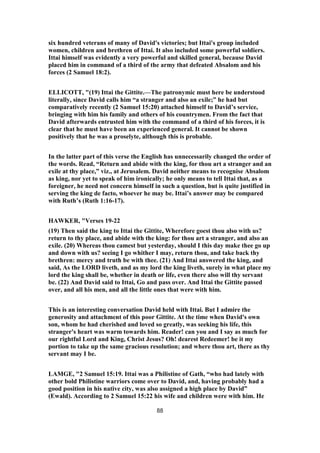
![was given command of one-third of the army (18:2), and stood along with Joab
and Abishai as an able general. It need not surprise us that a foreigner should
occupy such a military position; comp11:3, Uriah the Hittite. David advises this
faithful follower not to go with him, but to remain “with the king” at Jerusalem.
This phrase cannot mean: with him that is or will be king, according to God’s
will, whether it be David or Absalom (Keil, and so Seb. Schmidt: “it is not your
business to decide this contest: wait quietly, see whom God chooses and serve
him”), but it must be referred definitely to Absalom, who in David’s eyes is now
king de facto. Ewald: David gave him the friendly advice to stay in Jerusalem
with the new king. David thus neither recognizes Absalom as rightful king
(Böttch.), nor ironically so calls him = “with him who is acting as if he were
king” (Clericus). In this usurpation of the throne David recognizes and submits
to a divine dispensation, and so calls Absalom king.—The reason for his counsel
to Ittai: “For thou art a stranger and moreover an emigrant (exile) in thy place.
“Stranger” = not an Israelite; “emigrant or exile” (ֶהלֹ)גּ = one not in his native
land. The last phrase may be rendered: “for[FN26] thy place,” or “in respect to
thy place,” or may be taken to express a state of quiet (comp. Ges. § 154, 3 e).
The meaning is: “as a foreigner, thou needst not care who is king, or join either
side; stay where thou art.” The reading of Sept, Vulg, Syr, Arab.: “thou hast
come from thy place,” does not warrant us in changing the preposition “to” of
the Heb. into “from;” for, if the latter were the original text, it is hard to see how
the present difficult reading came. [The passage reads literally: “Return, and
abide with the king, for thou art a stranger and also an exile to thy place.” Eng.
A. V. transposes the last phrase, or supposes a parenthesis: “return to thy place
and abide,” etc. (and so Kimchi), and Bib-Com.: “Return and dwell with the
king (for thou art a foreigner and thou art an exile) at thy place” (i. e.
Jerusalem). Erdmann in his translation of the chapter (prefixed to the
Exposition) gives: “for thou art a stranger and moreover a man that has been
carried away from his place,” but here renders it quite differently: “for thou art
a stranger and an exile in thy place,” that Isaiah, remaining quietly in thy place
(Jerusalem, thy adopted home). Philippson: “thou art a stranger, etc., in respect
to thy place” (Gath, thy native place). The parenthesis of Eng. A. V. is
improbable, and Erdmann’s rendering in the Exposition is impossible; we must
adopt Philippson’s, or change the Prep. and read “from,” as Erdmann in his
translation. See the discussion in “Text. and Gram.”—Tr.]—Whether Ittai came
with his family ( 2 Samuel 15:22) and his kinsfolk ( 2 Samuel 15:20) to Jerusalem
as hostage (Thenius), or went over to David with other warriors (Ewald), cannot
be determined, as nothing is said thereon. But as he was a man in high position
and a distinguished military leader, and as David broke the Philistines’
supremacy in the last war with them (8:1), it is probable ( 2 Samuel 15:20 : “thou
camest yesterday”) that this victory of David’s was the occasion of his coming to
Jerusalem.
PETT, "2 Samuel 15:19
‘Then the king said to Ittai the Gittite, “Why do you also go with us? Return,
and abide with the king, for you are a foreigner, and also an exile. Return to
89](https://image.slidesharecdn.com/2samuel15commentary-160224024924/85/2-samuel-15-commentary-89-320.jpg)
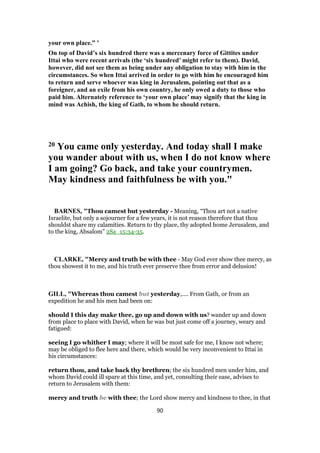
![thou hast shown favour and respect to me, and make good all his promises to thee,
who hast been true and faithful to me.
K&D, "“Thy coming is yesterday (from yesterday), and should I disturb thee to-
day to go with us, when I am going just where I go?” i.e., wherever my way may lie
(I go I know not whither; Chald.: cf. 1Sa_23:13). The Chethib ָך ֲנוּע ֲא is a copyist's error.
The thought requires the Hiphil ָך ֲיעִנ ֲא (Keri), as ַנוּע in the Kal has the intransitive
meaning, to totter, sway about, or move hither and thither. “Return and take thy
brethren back; grace and truth be with thee.” It is evidently more in accordance with
the train of thought to separate ְך ָ ִע from the previous clause and connect it with ת ֶמ ֱאֶו
ד ֶס ֶ,ח though this is opposed to the accents, than to adopt the adverbial interpretation,
“take back thy brethren with thee in grace and truth,” as Maurer proposes. (For the
thought itself, see Pro_3:3). The reference is to the grace and truth (faithfulness) of
God, which David desired that Ittai should receive upon his way. In the Septuagint
and Vulgate the passage is paraphrased thus: “Jehovah show thee grace and truth,”
after 2Sa_2:6; but it by no means follows from this that ָך ְ ִע ה ֶשׂ ֲעַו הָּוהְו has fallen out of
the Hebrew text.
LANGE, "2 Samuel 15:20. The sense is: “Shall 1 drag[FN27] thee, a stranger lately
come, and an exile, into my unquiet and precarious life?” Since I go whither I go,
without certain aim, “whither the way leads me” (Maurer). Comp. 1 Samuel 23:13.—
David wishes Ittai the favor and the faithfulness of God. From this and from Ittai’s
saying: “as the Lord lives,” it is probable that Ittai with his whole house had already
become a believer in the God of Israel. [From this expression we cannot infer
anything as to Ittai’s religious position, much less as to that of his family. Any
foreigner might believe in Jehovah as a deity and swear by His name (so Achish, 1
Samuel 29:6) without giving up his own gods. On general grounds it is not
improbable that Ittai accepted the God of Israel; but we have no information as to
any special religious depth or conversion in his history.—Tr.] It is doubtful whether
we should render: “carry thy brethren back with thee in grace and truth.” (Maurer),
or take the latter part separately: “with thee be grace and truth,” that Isaiah, God’s
(Keil); the accents favor the first, the connection of thought the second. Sept. and
Vulg. have: “and the Lord will do with thee grace and truth,” to which Vulg. adds:
“because thou hast shown grace and faithfulness,” whence Thenius (with Ew. and
Böttch. for the Sept. reading) will correspondingly change the Heb. text.[FN28] But
the words of Sept. and Vulg. seem to be an interpreting paraphrase, with the similar
words in2:5, 6, in mind. The text without this addition gives a good sense: “lead thy
brethren back; with thee be grace and faithfulness.”
PETT, "2 Samuel 15:20
“Inasmuch as you came but yesterday, should I this day make you go up and down
with us, seeing I go wherever I may? Return you, and take back your brothers. Mercy
and truth be with you.”
After all Ittai had only come to Jerusalem recently (although ‘yesterday’ was probably
not intended to be taken literally). How then could David expect him to share his
flight down to the Jordan rift and then into Transjordan, going wherever he felt it
necessary in order to avoid Absalom’s forces, not knowing what the outcome may be?
He might even never have the means by which to pay them. So David suggested that
91](https://image.slidesharecdn.com/2samuel15commentary-160224024924/85/2-samuel-15-commentary-91-320.jpg)
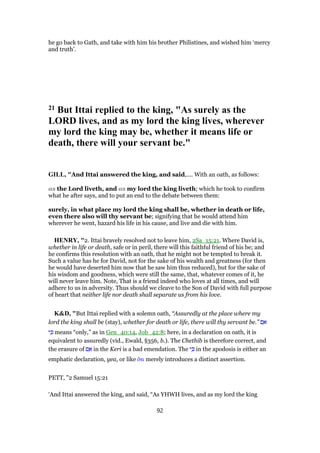
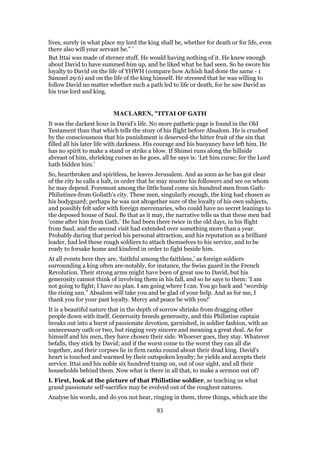
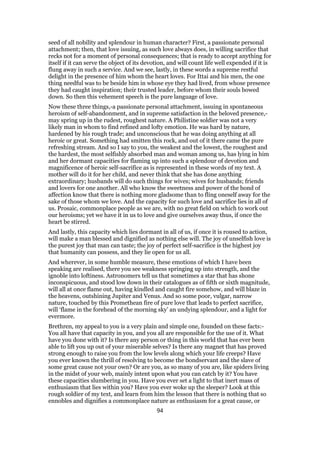
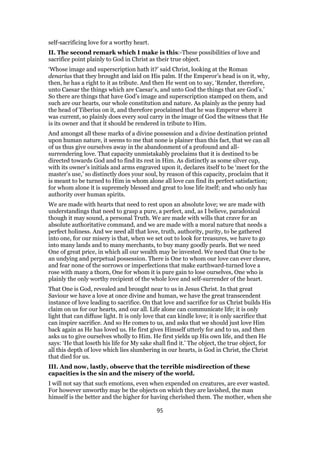
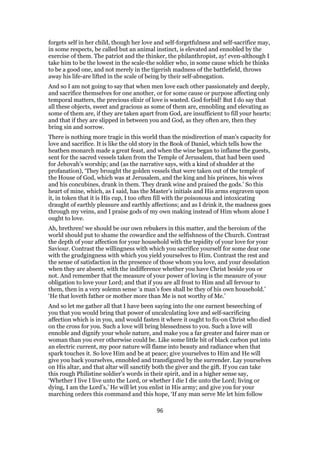
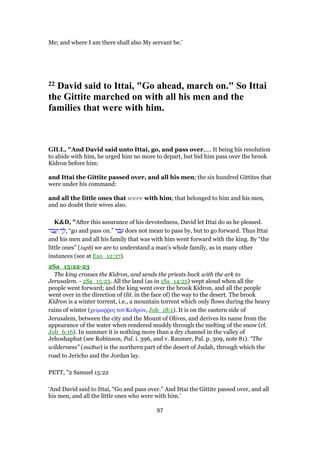
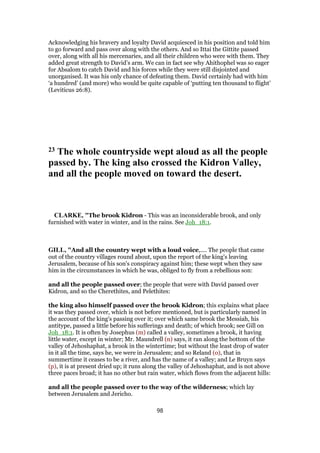
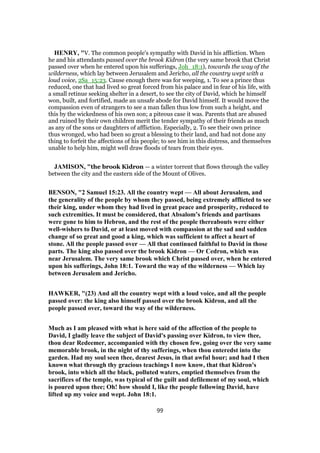
![LANGE, "2 Samuel 15:20. The sense is: “Shall 1 drag[FN27] thee, a stranger
lately come, and an exile, into my unquiet and precarious life?” Since I go
whither I go, without certain aim, “whither the way leads me” (Maurer). Comp.
1 Samuel 23:13.—David wishes Ittai the favor and the faithfulness of God. From
this and from Ittai’s saying: “as the Lord lives,” it is probable that Ittai with his
whole house had already become a believer in the God of Israel. [From this
expression we cannot infer anything as to Ittai’s religious position, much less as
to that of his family. Any foreigner might believe in Jehovah as a deity and swear
by His name (so Achish, 1 Samuel 29:6) without giving up his own gods. On
general grounds it is not improbable that Ittai accepted the God of Israel; but we
have no information as to any special religious depth or conversion in his
history.—Tr.] It is doubtful whether we should render: “carry thy brethren back
with thee in grace and truth.” (Maurer), or take the latter part separately: “with
thee be grace and truth,” that Isaiah, God’s (Keil); the accents favor the first, the
connection of thought the second. Sept. and Vulg. have: “and the Lord will do
with thee grace and truth,” to which Vulg. adds: “because thou hast shown grace
and faithfulness,” whence Thenius (with Ew. and Böttch. for the Sept. reading)
will correspondingly change the Heb. text.[FN28] But the words of Sept. and
Vulg. seem to be an interpreting paraphrase, with the similar words in2:5, 6, in
mind. The text without this addition gives a good sense: “lead thy brethren back;
with thee be grace and faithfulness.”
PETT, "2 Samuel 15:23
‘And all the country wept with a loud voice, and all the people passed over. The
king also himself passed over the brook Kidron, and all the people passed over,
towards the way of the wilderness.’
Meanwhile the whole country was in mourning. We are not necessarily to see
that they were weeping simply for David. They were indeed mainly weeping
because civil war was coming and they did not like what they saw ahead. (To
many it made little difference who was king as long as there was peace in the
land). They knew that civil war was especially hard on everyone. Meanwhile all
the people who were with David passed over the Wadi Kidron which was on the
edge of Jerusalem towards the east before reaching the Mount of Olives. They
were moving forward towards The Way of the Wilderness, the road which would
lead them via Jericho into Transjordan. The Wadi Kidron was dry in summer
but would flood with the winter rains.
24 Zadok was there, too, and all the Levites who were
with him were carrying the ark of the covenant of
God. They set down the ark of God, and Abiathar
100](https://image.slidesharecdn.com/2samuel15commentary-160224024924/85/2-samuel-15-commentary-100-320.jpg)
![offered sacrifices [3] until all the people had finished
leaving the city.
BARNES, "Abiathar went up - i. e., continued to ascend the Mount of Olives.
Abiathar was high priest 1Ki_2:35. Perhaps Zadok is addressed by David 2Sa_15:25
as the chief of those who were actually bearing the ark.
CLARKE, "Bearing the ark - The priests knew that God had given the kingdom
to David; they had no evidence that he had deposed him: they therefore chose to
accompany him, and take the ark, the object of their charge, with them.
GILL, "And, lo, Zadok also,.... The priest, as he is called, 2Sa_15:27,
and all the Levites were with him: with Zadok, or with David, and indeed with
both; but the former is rather meant here, being the immediate antecedent:
bearing the ark of the covenant of God: these were the Kohathite Levites,
whose business it was to bear the ark when carried from place to place, Num_3:31;
called the ark of the covenant, because the law which was the covenant between God
and the people, was put into it:
and they set down the ark of God: from off their shoulders, on which they
carried it:
and Abiathar went up; who was the high priest, and whose business it was to
attend the ark, and inquire before it, as occasion required; he went up very probably
to the mount of Olives, later mentioned, 2Sa_15:30,
until all the people had done passing out of the city; for from the top of that
mountain he could see the city of Jerusalem, and the people as they passed out of it,
and observe when they were all come out, or however ceased coming, and so knew
when it was a proper time to march forward.
HENRY, "Here we have, I. The fidelity of the priests and Levites and their firm
adherence to David and his interest. They knew David's great affection to them and
their office, notwithstanding his failings. The method Absalom took to gain people's
affections made no impression upon them; he had little religion in him, and therefore
they steadily adhered to David. Zadok and Abiathar, and all the Levites, if he go, will
accompany him, and take the ark with them, that, by it, they may ask counsel of God
for him, 2Sa_15:24. Note, Those that are friends to the ark in their prosperity will
find it a friend to them in their adversity. Formerly David would not rest till he had
found a resting-place for the ark; and now, if the priests may have their mind, the ark
shall not rest till David return to his rest.
101](https://image.slidesharecdn.com/2samuel15commentary-160224024924/85/2-samuel-15-commentary-101-320.jpg)
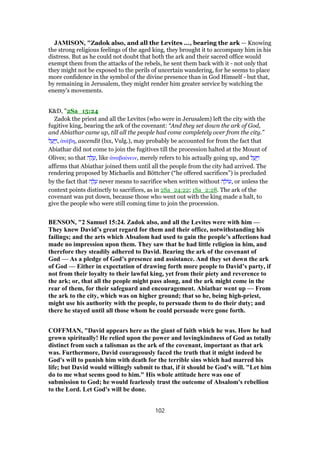
!["I will wait at the fords ... until word comes from you to inform me" (2 Samuel
15:28). There was also an excellent practical reason why David sent the ark and
its priestly and Levitical attendants back to Jerusalem. David would require
accurate and confidential information on Absalom's movements and other
developments of the rebellion; and he promptly arranged to procure such
information via the sons of the two priests mentioned here.
"May the Lord show steadfast love and faithfulness to you" (2 Samuel 15:20).
This is an unwelcome change from the text as given in ASV; KJV and NIV; and
Willis noted, "The last line of 2 Samuel 15:20 should read, `Mercy and truth be
with thee,' as in KJV, ASV, and NIV."[21]
"And Abiathar came up, and lo, Zadok came also, with all the Levites bearing
the ark of the covenant of God" (2 Samuel 15:24). We are pleased indeed that the
RSV has retained these words, thus effectively checkmating the old critical
dictum advanced in the last century to the effect that, "The Levites are unknown
to the Books of Samuel, so obviously (this mention of Levites) is a late
insertion."[22] Such opinions, of course, are unacceptable. The Levites are
mentioned in both Samuels, here and in 1 Samuel 6:15. Parallel accounts also
which are found in Kings and Chronicles indicate most emphatically that the
Levites during the reign of David fulfilled their usual purpose regarding the ark
of the covenant; and there is no good reason for supposing that they were not
involved here.
ELLICOTT, "(24) Zadok also.—Zadok appears here as in charge of the ark, and
David (2 Samuel 15:27) addresses him exclusively, while Abiathar is merely
mentioned. This gives no indication of the relations existing between the two, but
merely shows how matters went on this day of hurry and confusion. The
language is obscure, but probably means that Zadok and the Levites brought the
ark out of the city, and set it down while the multitude were assembling;
meantime Abiathar led the multitude forward up the Mount of Olives until they
had all come out of the city.
HAWKER, "Verses 24-26
(24) ¶ And lo Zadok also, and all the Levites were with him, bearing the ark of
the covenant of God: and they set down the ark of God; and Abiathar went up,
until all the people had done passing out of the city. (25) And the king said unto
Zadok, Carry back the ark of God into the city: if I shall find favour in the eyes
of the LORD, he will bring me again, and shew me both it, and his habitation:
(26) But if he thus say, I have no delight in thee; behold, here am I, let him do to
me as seemeth good unto him.
I have often admired the blessed frame of mind David was in, when he thus
expressed himself. Surely nothing but the grace and presence of the Lord with
103](https://image.slidesharecdn.com/2samuel15commentary-160224024924/85/2-samuel-15-commentary-103-320.jpg)
![him could have induced it at such a season. It is delightful to see that though the
Lord (according to his solemn declaration by Nathan) had raised evil out of his
own house, and though the Lord was correcting, he at the same time sustained
him under the pressure. His direction to Zadok is as high an evidence of David's
devotion and resignation, as we meet with in his whole history. Go Zadok, carry
back the Ark! what though I have not the symbol and representation of Jesus,
yet I shall have Jesus himself with me; and that will abundantly answer for all.
What the designs of my God are in this humbling, sorrowful providence, I know
not. Whether I shall ever see Jerusalem again, or whether I shall not; let my
Jesus choose for me, I have no choice myself. If I shall find favour in his eyes to
return, the Ark will be doubly sweet to my view; the habitation of God's house,
and all things pertaining to ordinances. But, if my God say nay to this, he will
not say nay to my soul in loving me. He hath spoken peace, and therefore will not
unsay it. Oh, Reader! what a frame of mind is here. Better to be thus in God's
hottest furnace, living upon Jesus, than at ease under any pleasing frames, or
supposed attainments of our own.
LANGE, "2 Samuel 15:24. Zadok (of the branch of Eleazar) with the priests took
the ark from its place ( 2 Samuel 6), brought it out to David, and set it down
where he halted (after passing the Kidron) on the declivity of the mount of
Olives, “to give the people that were yet coming on time to join the procession”
(Keil). On the other hand Abiathar (of the line of Eli [branch of Ithamar]) had
remained in the city “till the people had all passed over from the city.” He went
up, that Isaiah, of course, to the summit of Mount Olivet, where the ark was set
down; the rendering: “he sacrificed” (Schultz, Böttcher), is impossible, since the
verb ()עלה never has this meaning except in connection with the substantive
“burnt-offering” (ָהל)עוֹ [or some other offering, Isaiah 57:6.—Tr.], or without
reference to it in the connection; in the passages cited by Böttcher, 1 Samuel
2:28; 2 Samuel 24:22; 1 Kings 3:15, the context points to offering. Thenius
proposes to read: “and Abiathar waited,”[FN31] for which there is no necessity,
as the text in the connection (in respect to the locality) gives a good sense.—
[Böttcher: “And Zadok, etc., bearing the ark, etc., of God, and Abiathar the son
of Ahimelech at the head of all the Levites, and they set down the ark of God,
and Abiathar offered sacrifices until,” etc., an improbable reading, in which the
inserted clause is suggested by the Sept. ἀπὸ βαινὰρ = Abiathar. Wellhausen
acutely suggests that the words: “and Abiathar went up (or, offered sacrifices),”
are in the wrong place; the text reads: “they set down the ark till all the people,”
etc. It is hard to get any good sense from the present text, or to explain what part
Abiathar took in the proceedings. Some think he staid in the city till the ark was
set down; others (contrary to the text) that he preceded the ark, which was not
set down till he stopped. Probably Abiathar ought to be somehow connected with
Zadok in the bearing of the ark (see the plural “your” in 2 Samuel 15:27), and
perhaps in sacrificing; but we have not the means of satisfactorily restoring the
text.—Tr.]
PETT, "2 Samuel 15:24
104](https://image.slidesharecdn.com/2samuel15commentary-160224024924/85/2-samuel-15-commentary-104-320.jpg)
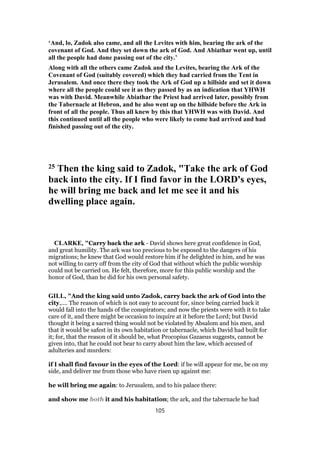
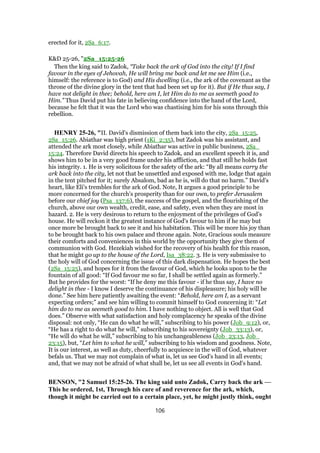
![not to be taken about from place to place, he knew not whither. And, 2d, Lest, if
he had carried it about with him everywhere, he should seem to trust in that
which was but the token of God’s presence, more than he did in God himself,
who had preserved him in the persecution of Saul, when he had not the ark with
him. But was he not exposing the priests to the violence of the usurper, by thus
sending them back to Jerusalem; especially as they had just given such evidence
of their fidelity to their king? To this it may be answered, that David hoped the
sacredness of their character would be a security to them against all violence. If I
find favour in the eyes of the Lord, &c. — If he shall be pleased to pardon the
sins for which he is now justly, although so severely, chastising me. He will bring
me again, and show me both it and his habitation — Will restore me to the
enjoyment of the privileges of his house, and the ordinances of his worship,
which I shall consider one of the greatest evidences of the return of his favour,
and one of the greatest blessings his goodness can confer upon me, even greater
than the being restored to my palace and throne. But if he say, I have no delight
in thee — I will not receive thee into my favour, nor restore thee to thy throne
and city, and to the enjoyment of my ordinances. Here I am — Ready to obey
him, and to submit to his will and pleasure concerning me. David saw plainly
that God, according to his threatening, had raised up this evil to him out of his
own house, and was punishing him for his sins, and he receives the chastisement
with resignation. “I imagine,” says Dr. Delaney, “I now hear him taking up the
same lamentation which Alphonsus the Wise, king of Arragon, afterward did
upon a like occasion: ‘I wonder not so much at my people’s ingratitude to me, as
at my own to God.’ Hence, in this spirit of humiliation, David would not presume
to have the ark, the symbol of the divine presence borne before him in that war:
that was an honour of which he deemed himself utterly unworthy. And,
therefore, referring himself and his affairs to the disposal of the Divine
Providence, he remanded Zadok and Abiathar back to the city with the ark.” Let
him do with me as seemeth him good — I have nothing to object; it is all well
that God doth. Thus ought we cheerfully to acquiesce in the will of God,
whatever befalls us. And that we may not complain of what is, let us see God’s
hand in all events. And that we may not be afraid of what shall be, let us see all
events in God’s hand.
LANGE, "2 Samuel 15:25 sqq. The ark sent back. David declares that he does
not need this sign of God’s gracious presence and protection. His reason for this
is expressed in the words [ 2 Samuel 15:26]: “if I find favor,” etc., wherein in
contrast with the visible sign of God’s presence he emphasizes His spiritual
nearness, on which everything depends, and gives himself unconditionally up to
the will of the Lord, whom he knows to be present, whose hand he sees in these
events, according to the announcement made him by Nathan. He resigns himself
to God in the proper sense of the word for “favor or disfavor.” David speaks
only to Zadok, who here (as in in 2 Samuel 15:24) appears as the officiating high-
priest at the head of the Levites. [But from 1 Kings 2:35 it seems that Abiathar
was the superior (Bib-Com., Bähr on “Kings” (Lange’s Bible-work), Patrick). It
is not improbable that some mention of Abiathar has here fallen out of the text
(see 2 Samuel 15:29); though it may be that in the distribution of duties the care
of the ark fell to Zadok. The two priests are throughout this narrative
107](https://image.slidesharecdn.com/2samuel15commentary-160224024924/85/2-samuel-15-commentary-107-320.jpg)
![represented as equally faithful to David.—Tr.]
PETT, "2 Samuel 15:25-26
‘And the king said to Zadok, “Carry back the ark of God into the city. If I shall
find favour in the eyes of YHWH, he will bring me again, and show me both it,
and his habitation, but if he say thus, ‘I have no delight in you’, behold, here am
I, let him do to me as seems good to him.” ’
But David was not happy at the thought that the Ark of God should be required
to join their wanderings. He had established it in a sacred Tent in Jerusalem,
and in his view that was where it belonged. And he had no doubt that YHWH
could help him from there. In his view to remove it would be an act of surrender
and an indication that he was not expecting to return. So he informed Zadok that
he should take it back to the city. As far as he was concerned all, including his
own future, was in YHWH’s hands and YHWH would do whatever He would,
no matter where His physical abode. Thus whether he himself was to find favour
at YHWH’s hands did not depend on the whereabouts of the Ark, for YHWH
was not limited and could work how and where He would. It simply depended on
YHWH’s own will and purpose. And that was what mattered. If YHWH was
intending to show favour to him then he would be brought safely back to the
place where the Ark dwelt, but if YHWH was, on the other hand, now saying ‘I
have no delight in you’, then he was willing to leave all in His hands. Let YHWH
do to him what seemed good. Emergencies like this always brought out the best
in David, and he was being reminded both of how dependent he was on YHWH,
and how universal was His power.
26 But if he says, 'I am not pleased with you,' then I
am ready; let him do to me whatever seems good to
him."
GILL, "But if he thus say, I have no delight in thee,.... As a king, or in his
temporal prosperity, though he might and had delight in him as a chosen vessel of
salvation, as a saint and child of God, and in his spiritual and everlasting welfare:
behold, here am I; his humble servant, ready to be, and do and suffer whatever is
his pleasure:
let him do to me as seemeth good unto him; strip me of all the ensigns of
royalty, dispossess me of my crown and kingdom, and dispose of me as seems good
in his sight; who is a sovereign Being, and has a right to do with his creatures what he
108](https://image.slidesharecdn.com/2samuel15commentary-160224024924/85/2-samuel-15-commentary-108-320.jpg)
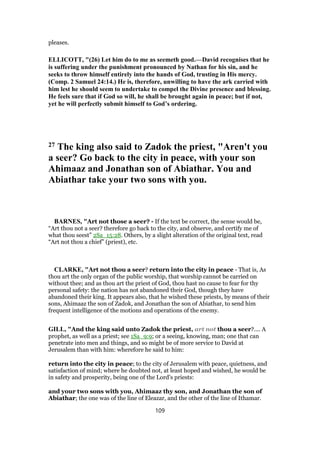
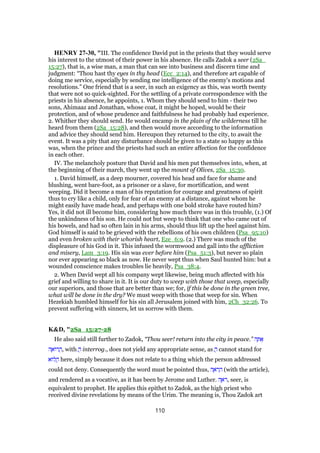
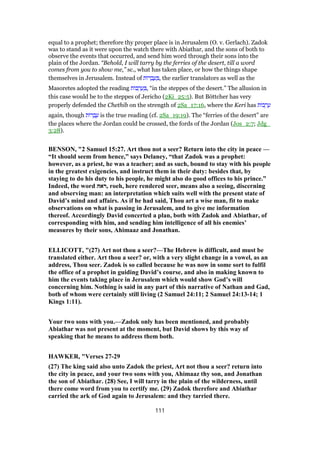
![Observe, how strong confidence he put in the counsel of God's Seer, that is,
God's prophet; through whom the Lord might graciously be pleased to convey
instruction. And, Reader! have not we that which is better than a thousand Seers
now? even his holy word, which is a constant light to our feet, and a lamp to our
paths.
LANGE, "2 Samuel 15:27 sqq. [The king says to Zadok: Return to the city, and I
will await word from you at the fords.] The word הראה [Eng. A. V. seer] presents
great difficulties if we adopt the interrogative pointing, and render: “Seest thou
not?” (Grot.), where the insertion of the negative is unwarranted, or: “Seest
thou?” (De Wette), or: “Understandest thou?” namely, what I have just said
(Böttcher), which renderings are partly too heavy, partly superfluous. [These
translations take the word as Participle. Eng. A. V. takes it as a substantive, and
unwarrantably inserts a negative, leaving out which, the rendering: “art thou a
seer?” is grammatically possible, but not suitable to the circumstances.—Tr.]
Instead of the Interrogative particle (ֲה) we must read the Article (ָ,)ה and render:
“Thou seer,” that Isaiah, thou prophet, “since a high-priest might certainly bear
this higher, yet archaic name” (Ewald). The high-priest might well be called a
seer, because he received divine revelations through the Urim and Thummim.
David’s reason for so naming him here is found in his words in 2 Samuel 15:25
sqq. Zadok is to return to Jerusalem and learn God’s will through events, and
through him David is to learn whether the Lord will again take him into favor
and restore him to Jerusalem; that Isaiah, Zadok was to act as seer for him.—
[This interpretation is hardly conveyed by the words. Zadok was to act as
observer, as reporter or intermediary between Hushai and David, and in fact
does so act. But he performs none of the functions of the official Roeh or Seer,
and it is not easy to see why he should be so called. Usage forbids us to take the
word in its literal sense: “seeer” = observer. Wellhausen’s reading: “high-priest”
()ראש belongs to a later time, and that of the Sept. “see!” (ה ֵא ְ)ר seems to offer
fewer difficulties than any other.—Tr.]—Ahimaaz and Jonathan the sons of the
two high-priests are to be the messengers to bring news from Jerusalem; comp. 2
Samuel 15:28 and 2 Samuel 15:36.—In 2 Samuel 15:28 we retain (from17:6
comp. with19:19) the Kethib or text: “the fords of the wilderness” (instead of the
Qeri “plains”[FN32] [so Eng. A. V.], 2 Kings 25:5), the point where one passed
from the wilderness over the Jordan. Thither (to the west side of the Jordan)
David had to repair in order to escape any threatening danger by crossing the
river at one of the several fords in the vicinity; and there he would await
information from Jerusalem. Comp. the Jordan-fords, Joshua 2:7; Judges 3:28.
PETT, "2 Samuel 15:27
‘The king said also to Zadok the priest, “Are you not a seer? Return into the city
in peace, and your two sons with you, Ahimaaz your son, and Jonathan the son
of Abiathar.” ’
David then pointed out to Zadok that he was a seer. He was thus one who could
112](https://image.slidesharecdn.com/2samuel15commentary-160224024924/85/2-samuel-15-commentary-112-320.jpg)
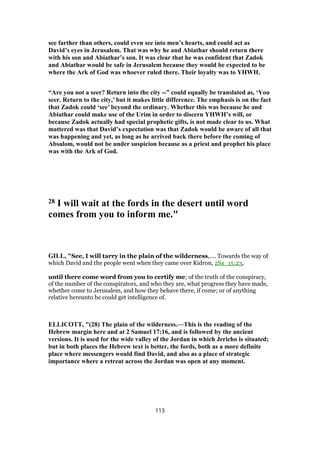
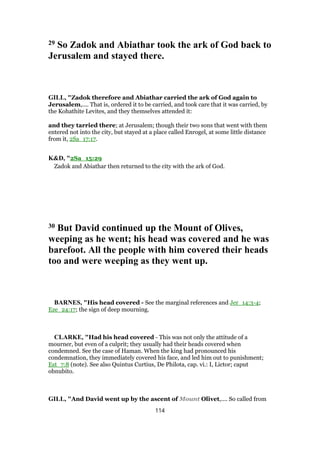
![the olive trees that grew upon it, which is often mentioned in the New Testament,
and where our Lord Jesus Christ, the antitype of David, often was, in his state of
humiliation, Mat_26:30, and from whence he ascended to heaven after his
resurrection, Act_1:12; it was about a mile from Jerusalem, to the east of it:
and wept as he went up; thinking perhaps of the wickedness and rebellion of his
son, of his own hard case, to be obliged to quit his metropolis and palace, and make
his flight afoot; and perhaps also of his own sins, which were the cause of his
calamities:
and had his head covered; with his mantle, with which he enwraped himself as a
mourner, 2Sa_19:4; so the Egyptians used to cover their heads in mourning, and the
Romans in later times (q); so Megara in sorrowful circumstances is represented as
having her head covered with a garment (r):
and he went barefoot; in token of mourning also, and like one forlorn, and going
into captivity, see Isa_20:2,
and all the people that was with him covered every man his head; as David
did, and in imitation of him, and sympathizing with him; and which was sometimes
done when men were ashamed and confounded, Jer_14:3,
and they went up, weeping as they went up; the mount of Olivet, grieved for
their king, and the distresses and calamities that were coming upon them.
JAMISON, "David went up by the ascent of mount Olivet — The same
pathway over that mount has been followed ever since that memorable day.
had his head covered — with a mourning wrapper. The humility and
resignation of David marked strongly his sanctified spirit, induced by contrition for
his transgressions. He had fallen, but it was the fall of the upright; and he rose again,
submitting himself meekly in the meantime to the will of God [Chalmers].
K&D 30-31, "Ahithophel and Hushai. - 2Sa_15:30, 2Sa_15:31. When David was
going by the height of the olive-trees, i.e., the Mount of Olives, weeping as he went,
with his head covered, and barefooted, as a sign of grief and mourning (see Est_6:12;
Eze_24:17), and with the people who accompanied him also mourning, he received
intelligence that Ahithophel (see at 2Sa_15:12) was with Absalom, and among the
conspirators. ידִ ִה דִו ָדְו gives no sense; for David cannot be the subject, because the
next clause, “and David said,” etc., contains most distinctly an expression of David's
on receiving some information. Thenius would therefore alter ידִ ִה into the Hophal
דַ ֻ,ה whilst Ewald (§131, a) would change it into ידִ ֻ,ה an unusual form of the Hophal,
“David was informed,” according to the construction of the Hiphil with the
accusative. But although this construction of the Hiphil is placed beyond all doubt by
Job_31:37; Job_26:4, and Eze_43:10, the Hiphil is construed as a rule, as the
Hophal always is, with ְל of the person who receives information. Consequently דִו ָ
must be altered into דִו ָד ְ,ל and ידִ ִה taken as impersonal, “they announced to David.”
Upon receipt of this intelligence David prayed to the Lord, that He would “turn the
counsel of Ahithophel into foolishness,” make it appear as folly, i.e., frustrate it, - a
prayer which God answered (vid., 2Sa_17:1.).
115](https://image.slidesharecdn.com/2samuel15commentary-160224024924/85/2-samuel-15-commentary-115-320.jpg)
![BENSON, "2 Samuel 15:30. David went up by the ascent of mount Olivet, and
wept as he went up — To think that one who was the offspring of his own body
should thus lift up the heel against him, and reflecting on his own conduct in the
matter of Uriah, as the cause of this calamity. And had his head covered —
Through shame and confusion. And he went up barefoot — In testimony of his
deep sorrow and humiliation for the sins whereby he had procured this evil to
himself; for these were the habits of mourners; and to take a holy revenge upon
himself for his former delicacy and luxury. “A more memorable event, surely,
was never recorded in history, nor a more moving spectacle exhibited to mortal
eyes! A king, venerable for his years and victories; sacred in the characters, both
of his piety and prophecy; renowned for prowess, and revered for wisdom,
reduced to the condition of a fugitive! to a sudden and extreme necessity of
fleeing for his life, from the presence of his own son, his darling and delight; and
a whole country loudly lamenting his fate! In this condition, David went up the
mount, and when he reached the summit of it, fell down prostrate before God.
Josephus tells us, that when David reached the top of the mountain, he took a
view of the city, and prayed to God with abundance of tears. The reader will
perhaps think it worth his notice, that Josephus should tell us, that David wept
and viewed the city in the same spot from which, the evangelist informs us, our
blessed Saviour wept over it.” — Delaney. And is this the glorious king of Israel,
the beloved of God, the wise, the victorious David, who slew his ten thousands?
Strange change indeed! What has produced this sad reverse? Sin alone has
wrought all this! These are its baneful effects: he forgot the commandment of the
Lord his God, and from hence has flowed all this evil! You that plead an excuse
for sin, because David, the man after God’s own heart, fell into it; remember,
likewise, what bitter and grievous punishments he underwent for it. Are you
willing to pay such a price for sin? And yet, be assured, the inviolable laws of
God require you to pay it in one way or other.
COFFMAN, "This account of David's leaving the city of Jerusalem, barefoot and
with his head covered, weeping as he went was called by Tatum, "One of the
saddest passages in the Bible."[23]
"Ahithophel is among the conspirators with Absalom" (2 Samuel 15:31). This
was a terrible blow indeed to David, as indicated by David's pouring out his
heartbreak in one of the Psalms written on this occasion. He responded to the
sad news with a prayer.
"O Lord turn the counsel of Ahithophel into foolishness" (2 Samuel 15:31). God
answered his prayer at once. Hushai agreed to return to Jerusalem to keep David
informed of things he might hear there concerning Absalom's strategy,"[24] and
also to frustrate, if possible, the counsel of Ahithophel.
HAWKER, "(30) And David went up by the ascent of mount Olivet, and wept as
he went up, and had his head covered, and he went barefoot: and all the people
116](https://image.slidesharecdn.com/2samuel15commentary-160224024924/85/2-samuel-15-commentary-116-320.jpg)
![that was with him covered every man his head, and they went up, weeping as
they went up.
How very suitable a frame was David now in! He saw the hand of God in this
affliction. This gave the additional bitterness to it. Moreover, be knew not what
the event might be. Either way, in success, or the contrary, it was full of evil. If
he conquered, it was a son, a beloved son, he subdued. If he fell himself, death
would be the consequence. In such a state, as a mourner, he might well go
barefoot and weeping. But Reader! can you accompany David in idea up the
ascent of Mount Olivet, and not recollect that holy mourner there, David's Lord?
Surely! no true believer in Christ can ever hear, or read, the name of Olivet,
without connecting with it Jesus, and his agonies there. That was the memorable
spot where thy Redeemer, my soul, sweat drops of blood, when the agony and
convulsion of his soul was so great in sustaining all the weight and pressure of
the divine justice due to thy sins, that David's grief for Absalom compared to it
was but as nothing. Here the powers of hell besieged him also, until it became
necessary that an angel from heaven should be dispatched to strengthen him.
And Reader! you will not forget, I hope, how the Son of God in that tremendous
hour in Olivet, was agitated backward and forward; when his whole soul was
exceeding sorrowful, even unto death; and when his few faithful disciples were
drenched in sleep, as if on purpose that no help, no comfort, should be afforded
him: and that, in redemption-work, of the people there should be none with him.
Isaiah 63:8.
LANGE, "2 Samuel 15:30. David went up the height of the olive trees, that
Isaiah, Mount Olivet [Eng. A. V.: the ascent (or acclivity) of Mount Olivet]. Deep
and loud mourning of David and all the faithful people that accompanied him.
“Covering the head” is the symbol of the mind sorrowfully sunk in itself, wholly
withdrawn from the outer world. Comp. Esther 6:12; Ezekiel 24:17. Of David it
is said besides that he went “barefoot,” “as a penitent” (Ewald), or: “to manifest
his humiliation in the sight of God” (Thenius).
PINK, "We resume at the point left off in our last. "The king said also unto
Zadok the priest, Art not thou a seer? return into the city in peace, and your two
sons with you, Ahimaaz thy son, and Jonathan the son of Abiathar. See, I will
tarry in the plain of the wilderness, until there come word from you to certify
me" (vv. 27, 28). Though they could not be permitted to minister unto him in
holy things, he does not disdain their services; they could further his interests by
returning to their post of duty, and from there acquaint him with developments
in Jerusalem. What implicit confidence in them was evidenced by this
experienced strategist, in revealing to them his immediate plans—the place
where he intended to remain for the time being! O that God’s servants today so
conducted themselves that those in trouble would not hesitate to confide in them
and seek their counsel. "Zadok therefore and Abiathar carried the ark of God
again to Jerusalem: and they tarried there" (v. 29). Blessed obedience: sinking
their own wishes, complying with the will of their master.
117](https://image.slidesharecdn.com/2samuel15commentary-160224024924/85/2-samuel-15-commentary-117-320.jpg)
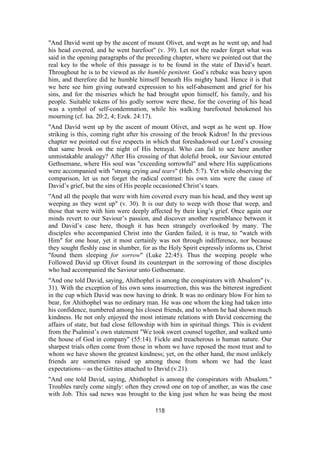
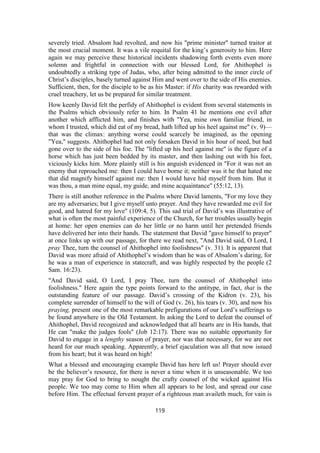
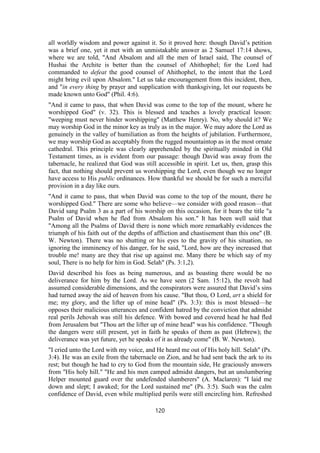
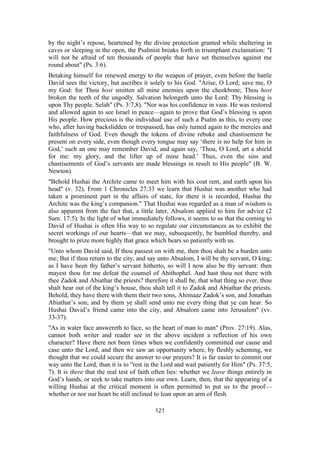
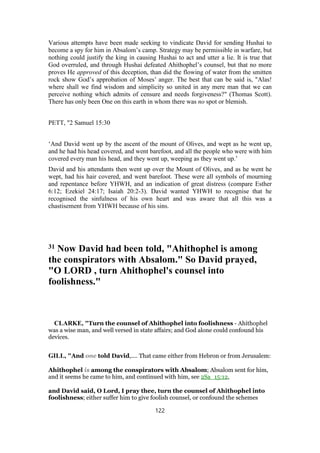
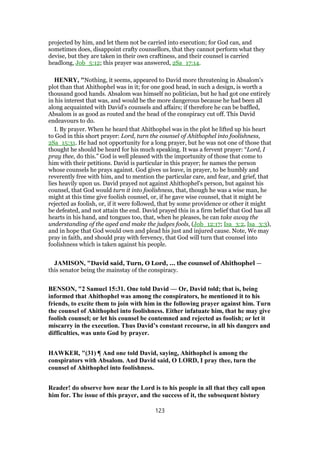
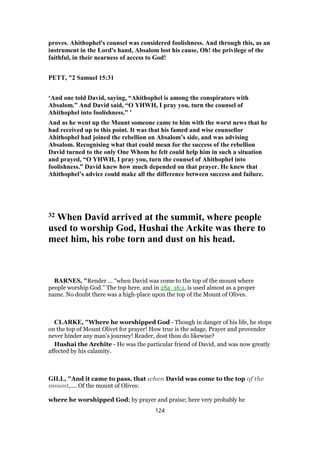
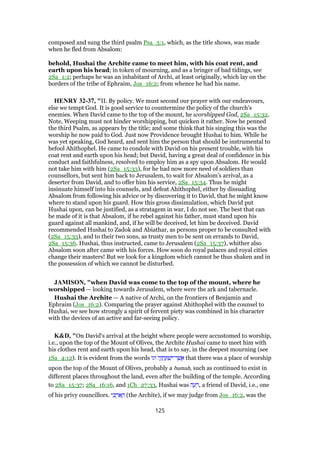
![name of a family whose possessions were upon the southern boundary of the tribe of
Ephraim, between Bethel and Ataroth. Hushai was probably a very old man, as David
said to him (2Sa_15:33, 2Sa_15:34), “If thou goest with me, thou wilt be a burden to
me. But if thou returnest to the city and offerest Absalom thy services, thou canst
bring for me the counsel of Ahithophel to nought. If thou sayest to Absalom, I will be
thy servant, O king; servant of thy father (i.e., as regards this) I was that of old, but
now I am thy servant.” The ו before יִנ ֲא introduces the apodosis both times (vid.,
Ewald, §348, a.).
BENSON, "2 Samuel 15:32. The top of the mount, where he worshipped —
Looking, doubtless, toward Jerusalem, where the ark and tabernacle, which he
had made for it, were. Hushai, the Archite came to meet him — Probably he was
from Archi, a city in the tribe of Ephraim, (see Joshua 16:2,) and coming to
Jerusalem, was made one of David’s privy council because of his wisdom;
otherwise, it is not likely that Absalom would so readily have entertained him,
and admitted him to his secrets. The coming of Hushai just at this time seems to
have been ordered by God’s peculiar providence, in answer to David’s prayer
mentioned in the preceding verse. With his coat rent, and earth upon his head —
In token of his great sorrow on David’s account.
COFFMAN, ""When David came to the summit where God was worshipped" (2
Samuel 15:32). The words `where God was worshipped,' refer to the fact that
David and his company paused there to worship God, despite the fact of their
lives all being in the most serious jeopardy. DeHoff said, "David was in danger of
his life, but he stopped on Mount Olivet for prayer,"[25] a prayer, incidentally,
which was answered by the events in this paragraph almost instantaneously. Yes,
God was with David even in the manifold sorrows of this dreadful experience.
THE ECHO OF ALL THESE EVENTS IN THE PSALMS
"The rebellion of Absalom and the humiliating flight of David brought out all
the better parts of the king's character and set him once more before us as a man
after God's own heart; and this part of his life is richly illustrated by the Psalms
which he wrote during the pressure of this great affliction. Psalms 41 shows how
poignant was his anguish over Ahithophel's treachery."[26]
"Psalms 3 and Psalms 4 were David's morning and evening songs `when he fled
from Absalom his son.' David's grief at the loss of his privileges of worship in
Jerusalem. In Psalms 27, we have the contrast between Jehovah's abiding
goodness and the inconstancy of man; and Psalms 61 and Psalms 62 were
probably written at Mahanaim when David's anguish of mind had been
assuaged."[27] In our commentary on the Psalms, we have explored many such
thoughts as these.
ELLICOTT, "(32) Where he worshipped God.—Rather, where men worship.
126](https://image.slidesharecdn.com/2samuel15commentary-160224024924/85/2-samuel-15-commentary-126-320.jpg)
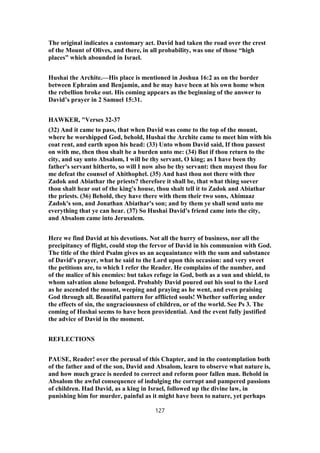
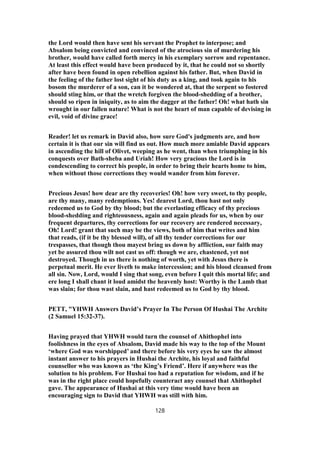
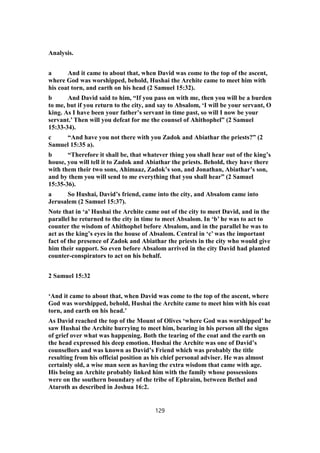
![That God ‘was worshipped’ at the top of the Mount of Olives is a reminder that
in David’s day there were still high places where YHWH was worshipped. As we
have seen previously, once the one sanctuary at Shiloh had ceased there were a
number of places where YHWH worship was carried on. It was fitting that at
such a place he would receive the answer to his prayers in such a specific way.
33 David said to him, "If you go with me, you will be a
burden to me.
CLARKE, "Then thou shalt be a burden unto me - It appears that Hushai
was not a warrior, but was a wise, prudent, and discreet man, who could well serve
David by gaining him intelligence of Absalom’s conspiracy; and he directs him to
form a strict confederacy with the priests Zadok and Abiathar, and to make use of
their sons as couriers between Jerusalem and David’s place of retreat.
GILL, "Unto whom David said,.... After he had heard what he had to say, and
what tidings he brought:
and if thou passest on with me; in his march and flight:
then thou shalt be a burden to me; being to be maintained by him; and David
having but scanty provisions, and so could not receive useless persons, as Hushai
might be, perhaps an old man, that could be of no service to him, and unfit for
travelling, and so would rather be an hinderance than an help unto him.
BENSON, "2 Samuel 15:33. If thou passest on with me, thou shalt be a burden,
&c. — For he was not provided, it seems, with sufficient support for his own
family; and Hushai, though famous as a counsellor in the cabinet, being
unpractised in the camp, and no soldier, could not be so useful to him in the
army as he might be at court. David therefore, conceives the idea of employing
him in endeavouring to defeat or render abortive the counsel of Ahithophel.
LANGE, "2 Samuel 15:30. David went up the height of the olive trees, that
Isaiah, Mount Olivet [Eng. A. V.: the ascent (or acclivity) of Mount Olivet]. Deep
and loud mourning of David and all the faithful people that accompanied him.
“Covering the head” is the symbol of the mind sorrowfully sunk in itself, wholly
withdrawn from the outer world. Comp. Esther 6:12; Ezekiel 24:17. Of David it
is said besides that he went “barefoot,” “as a penitent” (Ewald), or: “to manifest
his humiliation in the sight of God” (Thenius).
130](https://image.slidesharecdn.com/2samuel15commentary-160224024924/85/2-samuel-15-commentary-130-320.jpg)
